
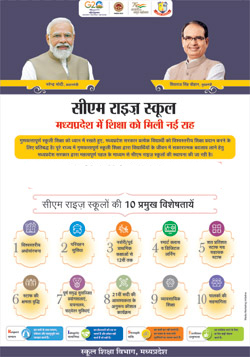
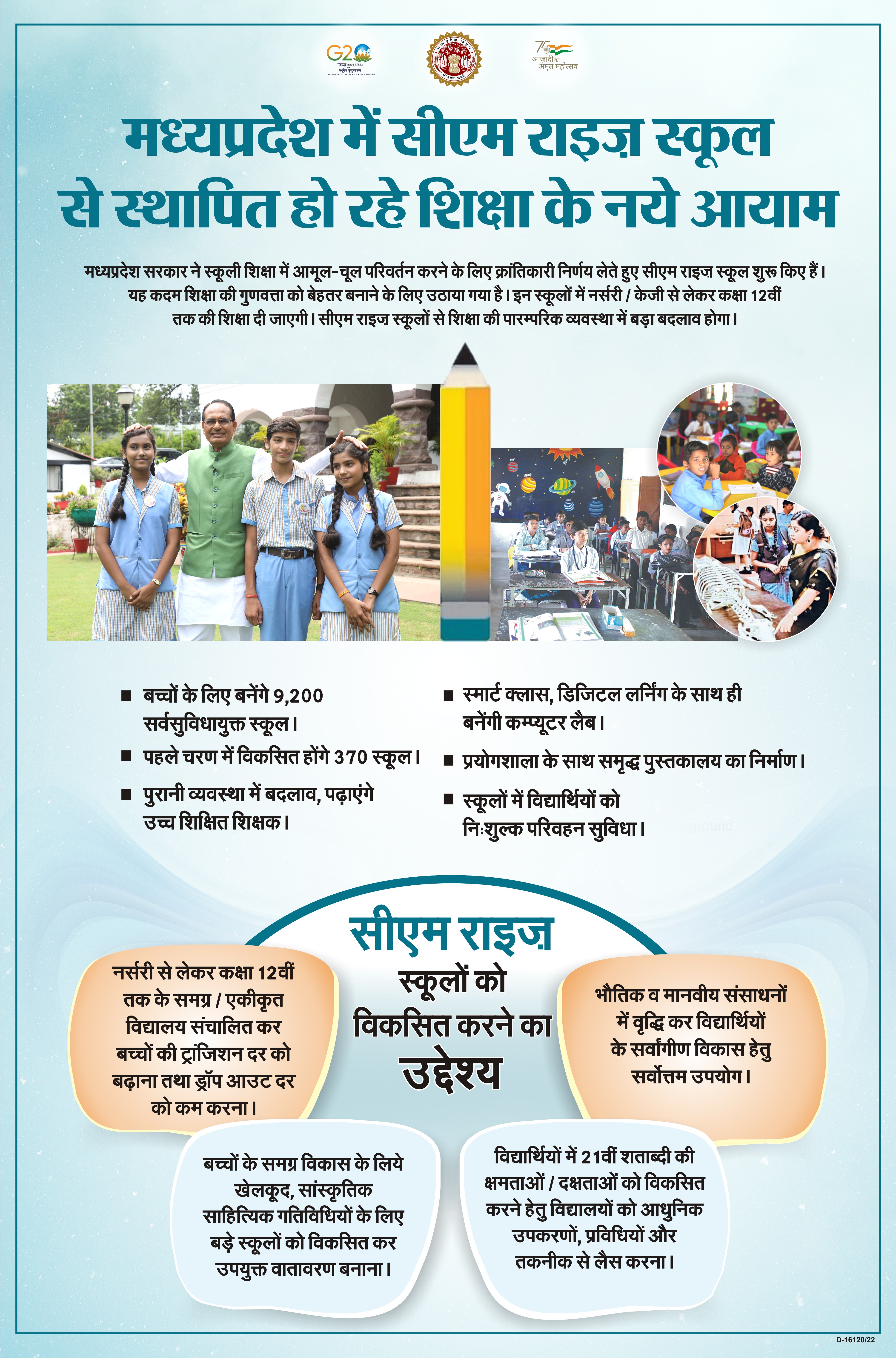
Along with the departmental goals, the principal should also set his own goals: Principal Secretary Mrs. Rashmi Arun Shami
MMNN: 10 May 2023
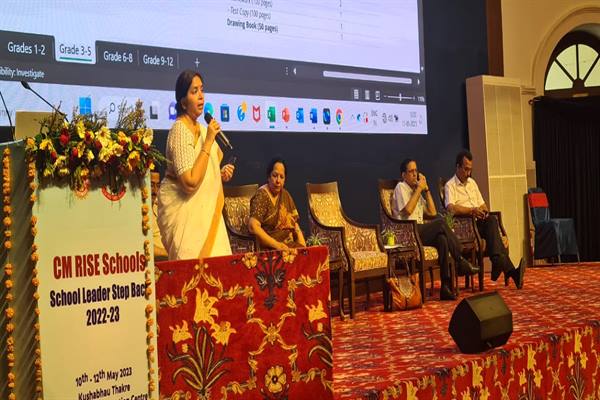
Bhopal:On the third and last day of the CM Rise School Leader Step Back program of School Education Department, Madhya Pradesh, Principal Secretary School Education Smt. Rashmi Arun Shami told the principals the importance of setting goals for the new session. He said that the principals of CM Rise schools should set their own targets along with the departmental targets and assess them properly. So that he will be able to know what are the difficulties and what efforts need to be made to solve them.
During the group work, all the school leaders discussed in small groups and brainstormed how the goals set by them in the previous year, the efforts made to fulfill them and how the difficulties could be resolved more easily.
Commissioner Public Education Mrs. Anubha Srivastava highlighted in detail the action plan for target setting and achieving it in the upcoming session. Along with this, the principals of CM Rise schools were informed about communication. He stressed on establishing a live interaction with the parents of the students with a view to establish better relations with the stakeholders.
Director Public Education Mr. D.S. Kushwaha and I.T. A presentation was shared by Coordinator Mr. Abhishek Chauhan on challenges in data collection such as staffing and performance related to board exams.
In the session on finance, Mr. Pankaj Mohan, Financial Advisor, School Education Department gave a presentation on the challenges related to finance and budgeting and informed about the work process to be easily edited under the financial rules and procedures.
In the open house session Principal Secretary School Education Mrs. Rashmi Arun Shami along with other officials answered the questions of the principals easily and director Mr. DS Kushwaha expressed his gratitude. Director State Education Center Mr. Dhanraju S, Director Public Education Mr. K.K. Dwivedi along with members of associate organizations and other senior officers, joint directors of all divisions and principals of all 274 CM Rise schools were present.
Teachers should have the sense of building future leaders of India
MMNN: 11 May 2023
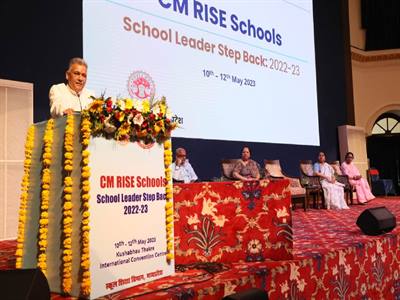
Bhopal:Minister of State for School Education (Independent Charge) and General Administration Mr. Inder Singh Parmar said in the three-day step back program of CM Rise Schools that the state government is in favor of building schools that give culture along with education. Addressing the principals of CM Rise schools, Mr. Parmar said that India was a world teacher and once again we will get back our ancient glory through your efforts. Nature and culture were the basic basis of education in the ancient education system of India. We are running a school full of values of Indianness based on the spirit of the National Education Policy 2020. CM Rise School is an important part of the National Education Policy 2020. Mr. Parmar told the present principals that they should not limit themselves to book-based teaching in their schools only. Rather give cultured education to the children through nature and culture. Shri Parmar congratulated all the teachers on the successful completion of one year of CM Rise schools. He said that while making radical changes in the education sector, it is the responsibility of the teacher to create an excellent citizen who solves all the problems of the society. There is a need to incorporate India's own heroes and knowledge tradition in education according to Indian philosophy.
During this, Shri Parmar also inaugurated the website of CM Rise Schools https://vimarsh.mp.gov.in/mpcmrise/site . He said that the basic objective of education in CM Rise schools is to create cultured students by providing quality education and vocational education.
Principal Secretary School Education Shromti Rashmi Arun Shami while giving information about National Achievement Survey and Program for International Student Assessment, PISA (International Student Assessment Program) educational programs organized at national and international level, Madhya Pradesh participates in these programs. Asked to be ready to include the students of.
The second day of the three-day CM Rise Step Back, organized by the School Education Department, Madhya Pradesh, began with the presentation of Mission Ankur, in which Director State Education Center Shri Dhanraju S. highlighted the efforts and action plan taken by the School Education Department for Basic Literacy and Numeracy (FLN). The objective of Mission Ankur by Shri Dhanaraju, 90 thousand F.L.N. Professional development program conducted for teachers, purpose of conducting baseline assessment in schools, observational data based on numeracy, literacy and reading skills were presented.
After this, a session on sports, co-educational, project based learning and STEAM (STEAM Science, Technology, Engineering, Arts and Maths) was organized. In which processes like how to ensure STEAM education in schools in CM Rise schools etc. were discussed. In this session, under the Fit India Initiative, how sports education can be further improved in schools and how to ensure all-round development of children through this was also discussed.
In the fourth session of the second day, preparation for competitive exams and career counseling were discussed. The life skills of the 21st century were presented in detail by Deputy Director Mr. Atul Danayak. A presentation on the infrastructure of well-organized schools was given by Mr. Kanakne, Construction Consultant, CM Rise Schools. Commissioner Public Education Mrs. Anubha Srivastava, Director Mr. K.K. Dwivedi, Mr. D.S. Kushwaha, along with members of associate organizations, other senior officers, joint directors of all divisions and principals of all 274 CM Rise schools run by the School Education Department were present.
Teachers are not only creating history but also the future of children: Mrs. Rashmi Arun Shami
MMNN: 10 May 2023
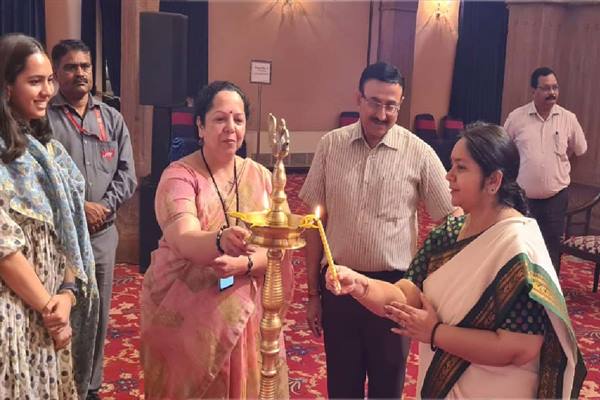
Bhopal:Principal Secretary School Education Smt. Rashmi Arun Shami inaugurated the 3-day Step Back Consultation Program of CM Rise Schools at Kushabhau Thackeray International Convention Center in Bhopal on Wednesday. Smt. Shami congratulated all the teachers on the successful completion of one year of CM Rise schools, which are creating new heights of education in the state. He said that bringing CM Rise schools into existence started with collective visioning. Through the presentation, he highlighted the work done in CM Rise schools in one year, achievements, challenges and future action plan.
Principal Secretary Smt. Shami informed that in the first phase, education has started in 274 CM Rise schools under the School Education Department. These include 53 district, 142 tehsil and 79 cluster level CM Rise Schools. Smt. Shami shared the future action plan along with the assessment of previous years' data regarding better results of CM Rise schools in board examinations. He also stressed on the importance of attendance of children in schools. CM Rise told the teachers for better operation of the schools that you are not only creating history but also the future of the children. In the three-day discussion, the upcoming action plan will be discussed along with the analysis of the success and difficulties of the work done in the last one year in different sessions in CM Rise schools.
Commissioner Public Education Smt. Anubha Srivastava said that the purpose of the three-day discussion is to review the works done on the occasion of successful completion of one year of CM Rise schools, share achievements, challenges with each other and prepare future action plans. Mrs. Srivastava said that the School Education Department is working with commitment for all possible implementation of best practices.
Principal Secretary School Education Smt. Shami felicitated the joint directors of all the divisions by presenting gifts and mementos on the successful completion of one year of CM Rise schools.
On the first day of the Step Back discussion program, the joint directors of all the divisions presented the activities completed in the last year in the CM Rise schools of their division. In the evening session, tips from the Art of Living program were also given to the preachers.
In the programme, Director State Education Center Mr. Dhanraju S, Director of Directorate of Public Education Mr. K.K. Dwivedi, Mr. D.S. Kushwaha along with other senior officers, joint directors of all divisions and principals of all 274 CM Rise schools started in the first phase were present.
Rs 2847 crore 63 lakh sanctioned for 70 fully equipped CM Rise schools Revised administrative approval for irrigation projects worth Rs 1207 crore 36 lakh free land allotment Ratification regarding lien rights of government land holders of urban areas Sanction of Risk Allowance for Linemen Selection of 10 districts for 6 products Approval for computerization of revenue courts Approval of 25 new mobile and 20 new permanent kitchen centers Approval of 972 posts Revised administrative approval of Rs 328 crore Amendment in norms of crop damage assistance amount other decisions
MMNN:23 April 2023

Bhopal :
A meeting of the Council of Ministers was held at Mantralaya under the chairmanship of Chief Minister Shri Shivraj Singh Chouhan today. The cabinet decided to construct 70 well-equipped schools in the state with an estimated cost of Rs. CM in the state In the first phase of the Rise scheme, 275 schools are being developed by the School Education Department.
Minister Dr. Mishra did Bhoomi Poojan of CM Rise School in village Basai
MMNN: 20 April 2023
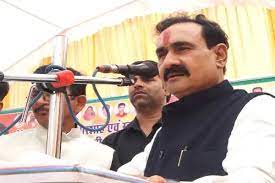
Bhopal:Home Minister Dr. Narottam Mishra performed bhoomi-pujan of Rs 38 crore 96 lakh CM Rise School in Basai village of Datia on Thursday. He said that Basai will not lag behind in the race of development.
Minister Dr. Mishra said that the CM Rise School will be full of all facilities and the education facilities here will also be of excellent class. Bus facility will be available to take the children. Basai will also play an important role in the development of Datia developing as a hub of education.
Minister Dr. Mishra informed the citizens about the public welfare schemes of the state government. He also inquired about the registration being done under Mukhyamantri Ladli Bahna Yojana. Dr. Mishra assured that all the eligible sisters would get the benefit of the scheme.
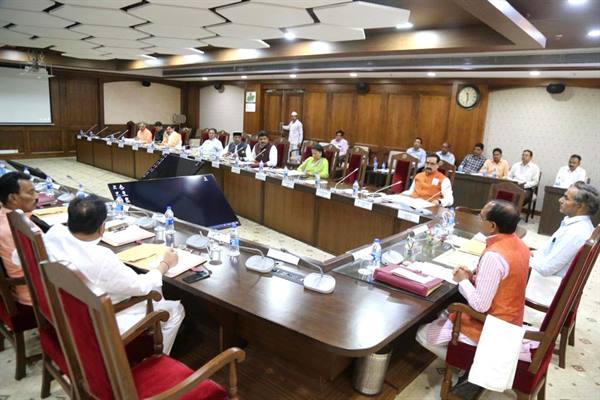 730 P.M. in the state. Ratification of establishment of Shree Schools
730 P.M. in the state. Ratification of establishment of Shree Schools
Bhopal:MMNN: 4 April 2023
Bhopal.A meeting of the Council of Ministers was held at Mantralaya under the chairmanship of Chief Minister Shri Shivraj Singh Chouhan today. Council of Ministers in the state at 730 P.M. Ratified the establishment of Shree Schools. Maximum 02 schools in each development block of the state (626 in 313 development blocks) and 104 schools in urban bodies of 52 districts, in this way maximum 730 schools have been given P.M. Will be marked as Shree School. One of the identified schools will be run for primary education (Class I to VIII) and one school for higher secondary education. PM The cost of Shree School will be borne by the Center and the State in the ratio of 60:40. All 730 p.m. Annual expenditure of Rs 277 crore 40 lakh will be incurred on Shree schools. Out of which the state share will be Rs 110 crore 96 lakh per year. This project is of 5 years and during this period the expenditure burden of Rs 554 crore 80 lakh will fall on the state government. After 5 years of the scheme, it will be completely operated by the state government.
It is noteworthy that P.M. Shree School will include quality of education, equality and access to education facilities with overall compliance with the provisions of the National Education Policy-2020. These schools will be presented as examples for other schools.
100 MBBS at Budhni in Sehore district by the Council of Ministers. Rs 714 crore 91 lakh for establishment of 60 seat admission capacity nursing college for nursing courses and 60 seat admission capacity college for paramedical courses along with establishment of new medical college of seat admission capacity and 500 bed affiliated hospital. Administrative approval has been granted. Due to the long distance from the medical colleges located in Hoshangabad, Itarsi, Pipariya, Betul and surrounding areas to Bhopal, Jabalpur and Chhindwara, the people of the area will get medical facilities easily.
Acceptance of free government guarantee amount of Rs 29 thousand 400 crore in support price decentralized scheme
The cabinet has given free government guarantee amount of 29 thousand 400 crores for the period from April 1, 2023 to March 31, 2024, for the procurement of food grains, public distribution system and operation of other government schemes and for meeting the deficit under the support price decentralized scheme in the state. Sanctioned Rs. Apart from the amount available from the government guarantee, the finance of the remaining amount will be done from the food grain credit limit with higher rate of interest. Out of the free government guarantee, the Food Department has been given the right to re-allocate between Madhya Pradesh State Civil Supplies Corporation and Madhya Pradesh State Cooperative Marketing Federation from time to time.Sale of spares and spare engines of government helicopter Bell-430
In the tender issued by the Council of Ministers for the sale of Government Helicopter Bell-430's spares and spare engines, an amount of Rs. The decision was taken.other decisions
While approving the departmental proposal for amendment in Madhya Pradesh Film Tourism Policy-2020, the cabinet authorized the empowered committee to decide the second asterisk of sub-paragraph 10.1.3 of paragraph-10 of the policy.The cabinet approved the allotment of land to Ekatm Shikshan Samiti Bhainsoda Tehsil Nalkheda, District Agar Malwa and Bharatiya Kisan Sangh, Malwa Province Tehsil Malharganj District Indore on depositing prescribed conditions and amount.
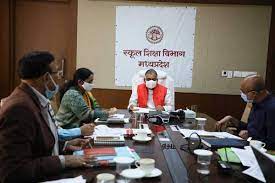 Minister of State for School Education (Independent Charge) Shri Parmar gave instructions for better implementation of departmental schemes
Minister of State for School Education (Independent Charge) Shri Parmar gave instructions for better implementation of departmental schemes
Bhopal:MMNN: 28 March 2023
Minister of State for School Education (Independent Charge) and General Administration Shri Inder Singh Parmar reviewed the Department of School Education in Mantralaya today. Minister of State Mr. Parmar gave instructions for better implementation of departmental schemes. Analyzing the examination results of the schools of the previous years, he asked to prepare an action plan for improving the examination results and filling up posts in CM Rise schools. The officials gave updated information about the academic status of CM Rise, Excellence and Model School. The analysis of quarterly and half-yearly examination results of CM Rise schools was also reviewed. Mr. Parmar spoke about Bal Vatika operations, implementation of National Education Policy, progress of Vidya Samiksha Kendra, district-wise resources, human resources and gradation of schools, progress of district-wise ICT lab tender in the state, Gave necessary guidelines after a comprehensive review of various points including the updated status of tablet purchases being made available to teachers and regular payment of vocational training programmes. Shri Parmar reviewed the preparations for the local examinations of class 9th and 11th and gave instructions to conduct the examinations according to the rules.
Principal Secretary School Education Mrs. Rashmi Arun Shami, Commissioner Public Education Mr. Abhay Verma, Director State Education Center Mr. Dhanraju S and Additional Mission Director Mr. Lokesh Jangid and other officers were present in the meeting.
Changes visible in school education system
Bhopal:MMNN: 3 January 2020
School education paves the way to the future of children. Therefore, it is important that there should be quality in education, schools must have good environment and teachers must be rich in knowledge so that children are always eager to attend school and study. The state government has taken many landmark decisions in the last one year to set up quality school education system in the state. Now children have started attending school, teachers have also become more dedicated towards providing good education to children. The change is becoming visible.
Exposure Visit
“Learn for the best” scheme has been implemented to improve the quality of school education. Under the scheme, departmental officers, principals and teachers visited local private schools, schools in Delhi, Mahamaya School in Noida and Korea Development Institute of South Korea. This has changed the thinking and teaching style of principals and teachers. They are beginning to realize their responsibility towards children’s education and are coming to schools regularly.
Daily checking of children’s copies
System of daily checking of children’s copies of basic subjects has been implemented in schools. District and state level officials are visiting schools to ensure that the teachers check the copies of students daily and correct mistakes. A special copy checking campaign has been launched in 2742 schools in the state. Disciplinary action is being taken against teachers who do not check copies and do not mark corrections. Recently, increments of 139 teachers were withheld, deductions were made in the salaries of 425 teachers, 665 teachers were issued warning and 751 teachers were issued show cause notices.
Analysis of test results
A system for the analysis of exam results in schools has been made. In order to assess the efficiency of teachers of schools with less than thirty percent exam results, 6215 teachers appeared in the examination held on June 12 and 15, 2019. Efficiency improvement training was also imparted to the teachers. After this, a re-test was taken. Disciplinary action was taken against teachers whose results were not found satisfactory in this examination. Compulsory retirement was given to 16 teachers who failed in the open book exam after being imparted two months of training.
Parents-teachers Interaction
A system of regular parents-teachers meetings has been implemented in schools. Now parents-teacher meetings are being held simultaneously in every government school every three months. In these meetings, issues of student profiling, skill upgradation workbook, Partibha Parv results, bridge course, half-yearly examination, school attendance etc. are being discussed. About 40 lakh parents attended these meetings for the first time. On Children's Day, the Education Minister sent a letter to all parents urging them to cooperate in improving the quality and efficiency of students.
Annual Examination on Board Pattern for Class V and VIII
From the current academic session 2019-20, it has been decided to make annual assessment of children of fifth and eighth grade on board pattern in the sequence of amendments made in the Right to Free and Compulsory Child Education Act-2009. In order to pass the annual examinations of Class V and VIII, students will have to get minimum 33 percent marks. Failing to do so, they will have to re-appear for the exam after 2 months. If they are still not able to pass, then they will not be upgraded from fifth and eighth grade to the next class.
“Wall of Fame” Honour Scheme for Teachers
The “Wall of Fame” Samman Yojana has been launched to encourage teachers in the state from the academic session 2018-19. Under the scheme, efforts are being encouraged by the teachers and the school to play an excellent role in upgrading the basic skills in students from Class 3 to 8. Bronze, Silver and Gold Champion certificates will be given in the scheme. This year 851 teachers have been awarded Gold Champion certificates, 2187 teachers with Silver Champion and 4566 teachers with Bronze Champion Certificate and 7600 schools have been awarded.
Online transfer system
The “online transfer” system has been implemented. Teachers have been given priority in the posting in places of their choice. The teachers’ long pending demand for merger in the Education Department has been met. Now teachers are getting the benefits of salary, allowances and other facilities given to government servants in the Education Department.
Formation of Vigyan Mitra Club and Eco Club
Vigyan Mitra Club has been formed in all government secondary schools in the state and Youth and Eco Club in all primary schools and all secondary schools. Through these clubs, efforts are being made to generate scientific interest and awareness about health and environment protection in school students. Arrangements have also been made to give students an opportunity to develop their skills and interest in the fields of cultural, intellectual, sports, arts and handicrafts etc. Also, they are being diverted to meaningful and productive activities after school time.
Teachers’ Learning
Under the PEER Learning Scheme, educational interaction is being held in government schools at the cluster level one day in the last week of every month. In this, all teachers discuss their subjects, classroom achievements, problems and find solutions and implement them.
NCERT Syllabus
NCERT syllabus and textbooks have been acquired to make the students of the state fit to perform better in national level competitive examinations. In this academic session, the NCERT syllabus of the Faculty of Social Sciences from Class VI to Xth and Arts in Class XI has been implemented. By the year 2021-22, this course will be implemented in all subjects from IXth to XIIth in all government schools of the state in successive stages.
Life Skills Education Programme “Umang”
Efforts are being made to develop students’ skills in decision making, analysis skills, life skills to find solutions to problems and to keep pace with situations. For this, “Umang” programme has been implemented. This year, all the high schools and higher secondary schools in the state have been scaled up.
STEAM Conclave
Efforts are being made to introduce STEAM based education system in schools to develop creativity, critical analysis, collaborative learning, communication skills etc. among the students as per the 21st century. STEAM Conclave was held on October 30–31 last in which national and international level subject matter experts, representatives of NID, CRISP, IISIR, Science Center, CBSC / ICSC schools, School Education Department and other departments related to education held a brainstorming session on the experiments and innovations in the direction of STEAM education. With this system, students will be prepared for future jobs and national and international assessment tests (NAS and PISA) and the quality of education will be ensured. Also, like economically and academically developed countries, our students will also be able to move forward by integrating science, technology, engineering and mathematics with arts.
App based supervision and real time evaluation
A system of data and evidence based policy formulation has been implemented in the field of school education. Now the classes are being monitored by the app to ensure the work. Also, real-time evaluation of children is being done through the “Class Partner” app. Initially it has been implemented as a pilot project in 13 schools in Bhopal and Raisen districts.
The eligibility test of Higher Secondary teachers and Secondary teacher class has been conducted for recruitment of teachers for the vacant posts in schools. Now about 20 thousand teachers will be appointed soon. Schools will be strengthened and developed into high quality institutions. Focus will be on elementary education. A pilot project for pre-primary education has been started in 15 schools in Chhindwara, Bhopal, Sagar, Shahdol and Sehore districts. In future it will be implemented on a larger scale.
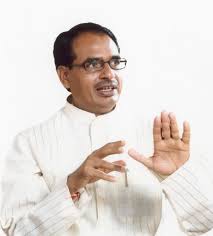 Over 3 lakh students of government schools undergo aptitude test
Over 3 lakh students of government schools undergo aptitude test
Bhopal:MMNN: 27 February 2018
In order to give information about higher education courses and related career options to students of Class Xth of government schools of the state, the School Education Department conducted aptitude test of 3 lakh 10 thousand students on February 15. The aptitude test was conducted in 8,152 government schools. Nearly 72 thousand 747 mobile sets were used in the test. Students answered 140 questions one by one on the M.P Career Mitra. CM Shri Shivraj Singh Chouhan had issued instructions to the School Education Department to conduct aptitude tests and career counseling for one lakh students every year for the choice of subject as per their interest. The future roadmap of students on the basis of their choice based on the aptitude test will be exhibited on M.P Career Mitra Portal. Students will be able to see a detailed report of their interest on the M.P Career Mitra Portal through their Samagra I.D. The portal will help the students in selection of subjects. They will also get information about the various courses being run by various educational institutions according to their interests on the portal. The entire programme will be run in three phases. The result of the aptitude test will be announces on April 2. Arrangement of counseling of each student and their parents will be made in all government schools in the month of June this year. For this an MoU has been signed with Shyamchi AAI Foundation, Pune. The Foundation will carry out the work using the Corporate Social Responsibility (CSR) fund free of cost.
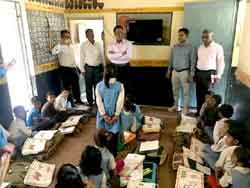 Primary school children studying through digital medium
Primary school children studying through digital medium
Bhopal:MMNN: 21 February 2018
Samnapur Jado is a village in Devri development block of Sagar district. Students of this primary school are being taught through digital medium. Children are being educated through LCDs and laptops in the school. Children are learning to write in cursive writing in this first digital school of the district. They are also learning multiplication, division, subtraction and addition in a more interesting way. Digital medium has made learning tables, counting, spellings and poems easier for children. District administration officials were surprised to hear a third class student Satyendras quick recital of the table of 19 when they came to the school. The level of education has increased in the village due to digital education. There are several such children in the school who have left private schools to take admission in this school. The school is setting up an identity as a model in the district. Enthused by success of the school, district administration and Department of Education have begun the process of opening another such school in the district. Bagda village sets an example in cleanliness Bagda village is about 15 kms away from Bhander block of Datia district. The village became totally transformed after the cleanliness campaign. There are C.C. roads in all the streets. The drains and roads are clean. Toilets have been constructed in the whole village and special attention is being paid for cleanliness. Villagers who used to defecate in the open until some time back, are now using toilets. Karan Singh, Bhagwat Singh, Munnalal, Arvind etc of the village say that now we all like our village very much. Children have also learnt to maintain cleanliness which has reduced illnesses to a great extent. Earlier one would have to see garbage, mud etc as soon as one entered the village. After the cleanliness campaign the roads have become so clean that one feels he has entered a township.
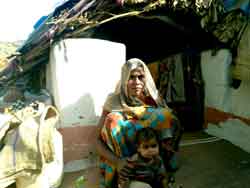 Sahariya familys Chhotu now goes to school after having a meal of jaggery and dalia
Sahariya familys Chhotu now goes to school after having a meal of jaggery and dalia
Bhopal:MMNN: 20 February 2018
Sahariya families are now happy ever since an amount of Rs 1,000 is being deposited in the accounts of the senior women in their houses every month for proper nutrition following Chief Minister Shri Shivraj Singh Chouhans announcement in his battle against malnutrition. Seven-year-old Chhotu, son of Sahariya couple Seema and Sagun Adivasi from Lahrouni village of adivasi region Karahal now goes to school after a meal of jaggery and dalia (broken wheat) and he also has his lunch in school under mid day meal scheme. With the amount given for nutrition, children of Sahariya families are now having three-time meal daily. Seema adivasi told that she has four children among whom the eldest one is 7-year-old Chhotu and the youngest is one-year-old. She said that with the money deposited in her account, she is now able to feed her children properly. With the money she received in January, she stocked jaggery and dalia and now feeds her children with either sweet dalia or namkeen dalia. With an additional arrangement of both sugar and jiggery, she prepares sweet dishes like halwa and lapsi also for them. They also get wheat and rice at Rs 1 per kg from the fair price shop under Public Distribution System. Dhoda Bai of the village is also happy with Rs 1000 being deposited in her account. A mother of two children Dhoda Bai says that her husband Saroop adivasi has a 4 bigha land on which they fend for themselves. Ever since they started getting Rs 1000 per month, it is of great help for them. Their kids Varsha and Badal study in Class VI and Class II respectively. She says that the money being given to them for childrens nutrition is being spent to feed for the children only. Like Seema and Dhoda Bai, 112 Sahariya women of this village have started receiving Rs 1000 per month. Distribution of this amount to the women of Sahariya families was started by the Chief Minister on December 25, 2017 at Karahal block headquarters. So far this amount has been deposited in more than 15 thousand Sahariya families in Sheopur district.
 National Gold Award to School Education Departments education portal.
National Gold Award to School Education Departments education portal.
Bhopal:MMNN: 9 February 2018
The education portal of Madhya Pradeshs School Education Department has been given the centres National e-governance gold award. The education portal has been given the award in the Innovation in Existing Project of Government Department category. The information of the award was given by the Centres Department of Personnel to Rajya Shiksha Kendra Director Shri Lokesh Jatav. The Gold award will be given at the 21st National e-Governance Seminar in Telangana capital Hyderabad on February 26 and 27. The education portal has been prepared to review the monitoring and results of the implementation of the academic and administrative works by the School Education Department. The M.P. education portal had been started with the help of National Information Centre (NIC) by School Education Department in year 2008 to provide better work execution and online services for school education related departments, offices, schools, teachers and parents. Keeping the changing times and needs in mind, new technique has been used in the portal and it has been made even more useful. The education portal is carrying out the integrated e-governance system work very well. Information of over one crore 50 lakh children of over 90 thousand settlements of the state and one lakh 50 thousand government and private schools is available online. Through the portal, effective management of salaries, service-books and services of more than 3 lakh 90 thousand teachers etc. of the state is being undertaken. The entire database of proven information of personal academic and bank accounts of students of over one crore 50 lakh schools of the state is being collected through the portal. Students are being provided over 35 scholarships and stipends and funds of more than Rs 500 crore under various incentive schemes of 9 departments online with one click in the most transparent manner. More than 13 lakh GEO tag photos have been taken of the available infrastructure of one lakh 25 thousand schools through the GIS at School app for the first time in the country. This has ensured availability of school resources in all settlements. Recognition of private schools is also being provided online in the most transparent and simplified manner under Right to Education law. Online admissions on 25 percent seats reserved for children of financially weak and deprived classes is also being made available in these schools. Through the education portal, aptitude tests have been undertaken of nearly one lakh 50 thousand students and their teachers have been graded schoolwise.
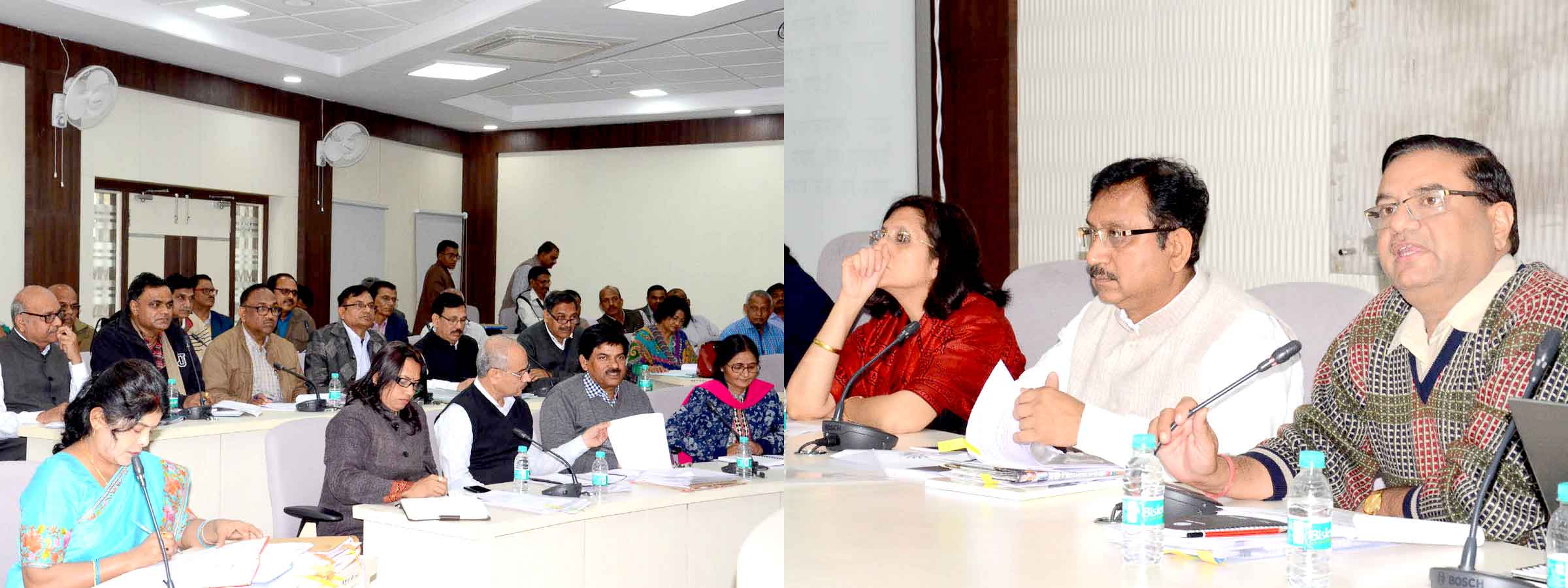 Make Efforts to Provide Quality Education under Clean Atmosphere in Government Schools.
Make Efforts to Provide Quality Education under Clean Atmosphere in Government Schools.
Bhopal:MMNN: 6 February 2018
Minister for School Education Kunwar Vijay Shah said that efforts should be made to provide quality education under the clean atmosphere to the children pursuing studies in government primary and middle schools for the success of Sarvashiksha Abhiyan. He instructed for paying special attention on all the necessary arrangements besides security in the hostels of School Education department. Kunwar Shah was addressing the state level meeting of District Project Coordinators and Principal DIET held at Narmada Bhavan of Bhopal today. Minister Kunwar Shah further mentioned that DIET plays an important role in education quality. He told that DIET should be developed in such a form that it should carved its niche at the national level. Forty five teachers training institutes are functional in the state. He gave directives for conducting a study tour of the prestigious DIET of the country for the modernization of states DIET. Kunwar Shah informed that an amount of Rs. 30 crore has been approved for the infrastructure development of DIET in the state. He instructed to decide the uniform for the staff and teachers of DIET. He stated that there is a need for wardens training, since the post holds very important role in hostel. Wardens should be imparted training on subjects like happiness, child psychology and moral education during the summer vacation. Moreover, he said that the habit of reading about the national festivals, biography of great personalities and local traditions besides news paper should be developed in the children. He mentioned that a policy has already been prepared for posting of the family members of the soldiers, who are stationed on the borders of the country, near to their homes. Minister Kunwar Shah said that directives have been given to the departmental officers to write to the State Public Service Commission to fill the vacant posts of lecturers in DIET and other 450 posts. Reviews National Achievement Survey and Shala Siddhi Programme The National Achievement Survey-2017 was reviewed in the meeting. It was informed that the survey was conducted for class 3,5 and 8. There is a small difference in the evaluation percentage between the boys and girls students and students pursuing studies in urban and rural area. Narsinghpur district has bagged first position in this evaluation process. Moreover, Shala Sidhi Programme, Ek Parisar Ek Shala Satyapan, Cycle and Uniform Distribution programme were also reviewed in the meeting. Principal Secretary Smt. Deepti Goud Mukherjee gave directives for downloading M-Shiksha Mitra App. She said that all must possess list of mentor schools. She also gave instructions for regular inspection of the government schools by the DIET. Director State Education Shri Lokesh Jatav said in the meeting, that there should be uniformity in the enrolment statistics of students in schools. On the basis of these statistics, facilities like uniform and scholarship are provided to the students.
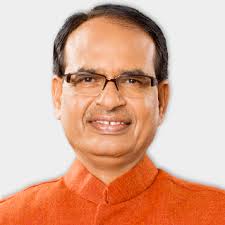 CM Shri Chouhans motivational dialogue with students on February 3.
CM Shri Chouhans motivational dialogue with students on February 3.
Bhopal:MMNN: 2 February 2018
Chief Minister Shri Shivraj Singh Chouhan will hold a motivational dialogue with students of Government Model School, TT Nagar Bhopal from 11 am on February 3. Shri Chouhan will inspire students to bring good results in their examination. Students of 10th, 11th and 12th will take part in the motivational dialogue. Earlier motivational dialogues have been organized in schools of all districts from January 15 to 30. Shri Chouhan will hold discussion with students on various schemes including Mukhya Mantri Medhavi Vidyarthi Protsahan Yojana and Pratibhashali Vidyarthi Protsahan Yojana. He will also give tips on time management without stress during examinations and how to move ahead with positive thinking in life. The motivational dialogue will be telecast live on Doordarshan Madhya Pradesh and on Akashvani. Vimarsh Portal and Career Mobile app to be inaugurated CM Shri Chouhan will inaugurate the M.P Career mobile app and Vimarsh portal and other schemes during the motivational dialogue. The career mobile app has been prepared to test the students aptitude to know in which subject the student should study further. Parents and students will be counseled on the basis of the students aptitude test report. The aptitude test of Class 10th students will be held in February. Vimarsh portal The Vimarsh portal has been prepared to strengthen students, teachers and schools from the academic point of view. Through this portal the students can share their problems and queries and find a solution. Videos on important subjects, answer sheets of merit holders and previous years question papers and model answers will be available on the portal for students. Students can easily understand any subject matter through this portal. The problems arising in the innovations and studies by teachers can be marked and shared with experts on the portal. The schools will conduct self-assessment every month. In this the qualitative progress of students will be given priority compared to evaluation and assets. There will be total assessments twice every year.
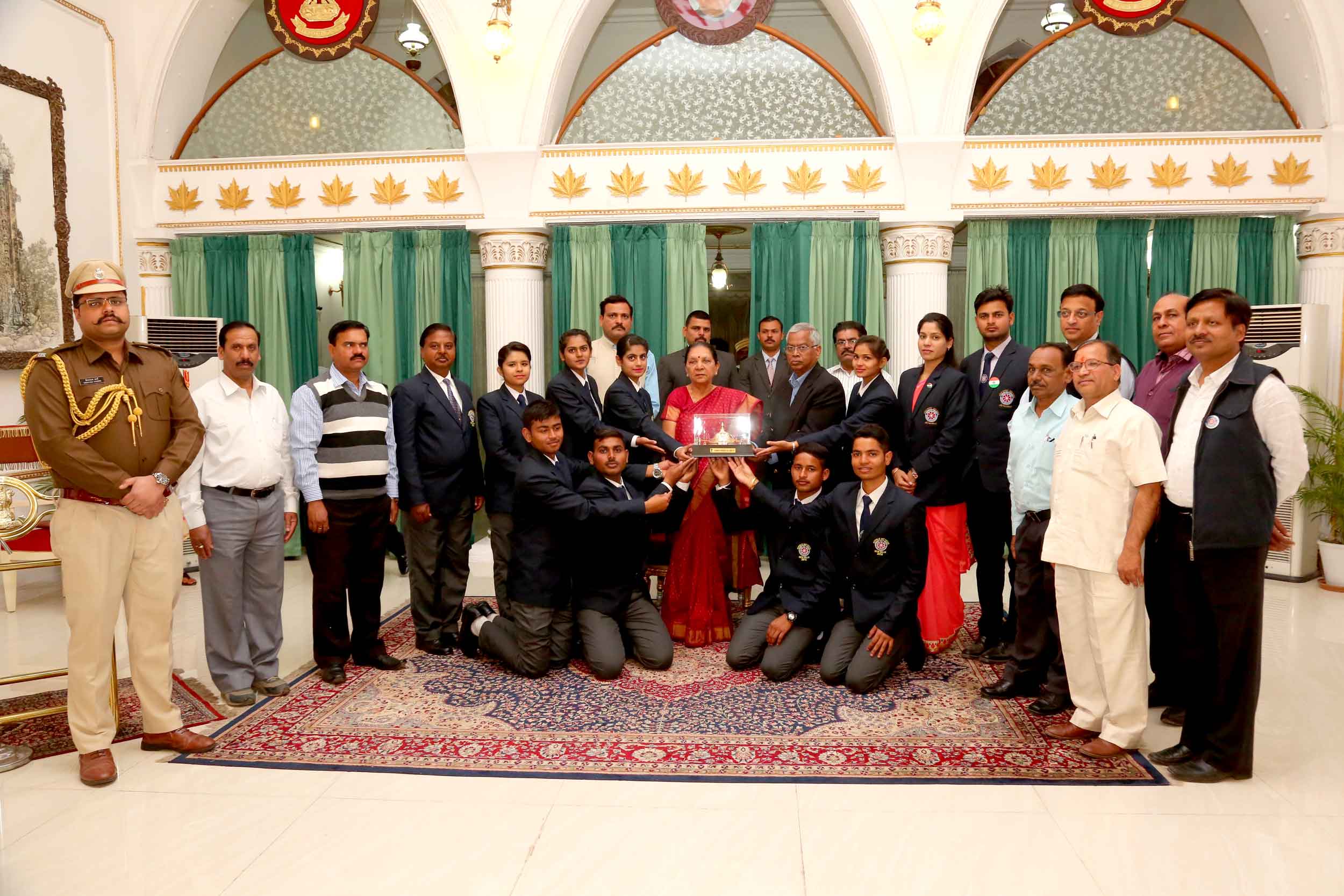 Volunteers should live with families in villages during NSS camp- Governor Smt Patel.
Volunteers should live with families in villages during NSS camp- Governor Smt Patel.
Bhopal:MMNN: 1 February 2018
Governor Smt Anandiben Patel asked students of National Service Scheme to live with rural families during camp in villages. Two-three children can live with one family; this will make children to get proper information about status of families and their difficulties. The governor said that good things learnt in the NSS camp should be adopted in the life as well. The governor stated this during meeting with a NSS volunteers and best award recipients who returned after participating in the Republic Day Parade 2018 from New Delhi, at Raj Bhavan today. Governor Smt Patel said that the motto of National Service Scheme is to make youth responsible citizens. Through NSS, students can contribute for the nation building and community work for awareness. They can develop their personality. The governor sought children's experience during the camp. She asked students that they should take resolution that they won't allow meaningless expenditure in marriages and neither take nor give dowry and motivated girl students to continue study who dropped out after class VIII. The governor said that they should choose one school in their city or village and carry out plantation and contribute in service of malnourished children and pregnant women. She said that they should help parents in works with service for the country and serve elderly people. The children gave their introduction and shared camp experiences. The governor presented memento to children. National Award winner of NSS, volunteer Shri Ajay Narayan Patel and Ku Upasana Mishra informed the governor about their awards. In the program, State NSS Officer Dr RK Vijay informed about NSS activities. On this occasion, Additional Chief Secretary, Higher Education, Shri BR Naidu and Commissioner Shri Neeraj Mandloi were also present
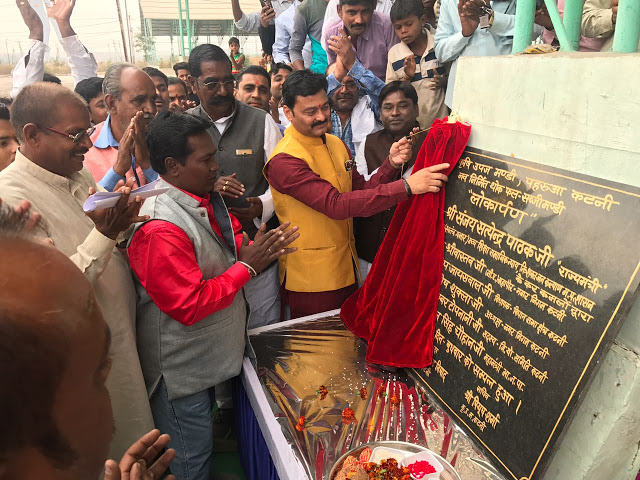 MoS Shri Pathak Dedicates High School Building.
MoS Shri Pathak Dedicates High School Building.
Bhopal:MMNN: 28 January 2018
Minister of State for Micro, Small and Medium Enterprises Shri Sanjay Satyendra Pathak dedicated High School building in village Kanti of Katni district on Saturday. He also participated in Prerna Samvad programme, held in the Higher Secondary school of the village. Shri Pathak shared his views with students during the Prerna samvad programme. He told students that they will succeed, if they make preparations with strong determination to achieve their goals. Shri Pathak also performed bhoomi poojan of concrete road costing Rs. 23 crore, to be constructed from Vijayraghavgarh to Kari Talai.
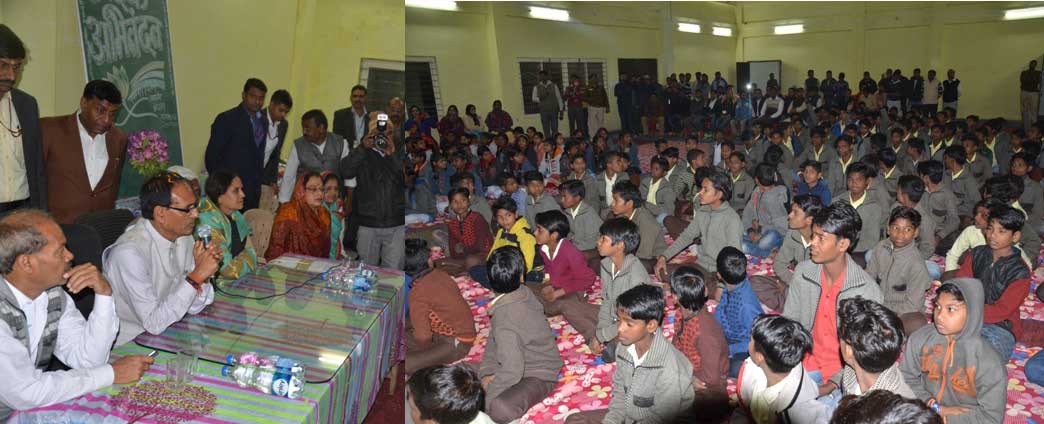 CM Shri Chouhan meets students of Sahariya Residential School.
CM Shri Chouhan meets students of Sahariya Residential School.
Bhopal:MMNN: 26 January 2018
Chief Minister Shri Shivraj Singh Chouhan along with his wife visited the Eklavya Sahariya girls/boys hostel in Guna on Thursday on Republic Day’s eve. Giving tips on success in life, he told the students to make it a practice to wake up before sunrise and got to bed early. He said they should study well, and that the expenses of their higher education will be borne by the state government. He said that if they study well only then can they become knowledgeable. The Chief Minister told the students that they should have skill to work. He said that Eklavya Residential Schools have been set up in state to provide best education to youth. CM Shri Chouhan told students that state government will deposit fees for the higher education of students abroad or in Medical College, Engineering College, Polytechnic College etc. The need is that the students should get admission in such colleges so they should put in great effort ad a lot of study. Reminding students of their forthcoming examinations, the Chief Minister said that they should put in more efforts and study with full concentration. They should try their best to make their family and village proud. He said that this applies to the students of all sections of society. Taking stock of the arrangements at the residential school from the students, Shri Chouhan asked them what sort of food they are provided at the hostel, whether they have received books of all subjects or not, why they should study well? The students replied to all the queries of the Chief Minister with ease. The Chief Minister and his wife served dinner to the students at the hostel and even fed some of them. He instructed the District Collector to make strengthen and improve arrangements at the Eklavya Residential School. MLA Shri Pannalal Shakhya and Smt. Mamta Meena, District Panchayat President Smt. Archana Chouhan, Nagar Palika President Shri Rajendra Saluja and other public representatives were present on the occasion.
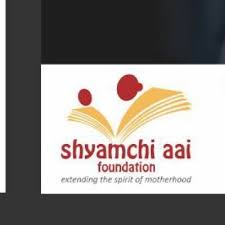 Aadhar registration is necessary for free admission in private schools.
Aadhar registration is necessary for free admission in private schools.
Bhopal:MMNN: 19 January 2018
Under the Right to Education Act, the process for free admissions in class first of private schools in academic session 2018-19 will soon begin. In this regard, the centre government has made necessary aadhar registration for free admission along with other documents in the coming session. Online process is underway for free admission in class first in private schools under the Right To Education Act, in Madhya Pradesh. Online application is availed on RTE portal www.educationportal.mp.gov.in/RtePortal, for facility to applicant. Applications are made available without charge through Jan Shiksha Kendra, BRC, BEO office and district education office and District Education Centre offices as well. Under the online process, applicants themselves get registration online in prescribed format. Free admission is given to children of deprived and weaker section on minimum 25 percent seats in class first in private schools under Right to Education Act, in the state. Children of scheduled caste, scheduled tribe, nomadic community, forest patta holder family and children having more than 40 percent disability are included in deprived section. Children of families, who live below the poverty line can apply for free admission in private schools under weaker section category. Director, State Education Center, Shri Lokesh Kumar Jatva, has urged all applicants to get aadhar registration of children in time frame before admission process.
 Six lakh students of government schools to undergo interest test.
Six lakh students of government schools to undergo interest test.
Bhopal:MMNN: 16 January 2018
The School Education Department has decided to conduct interest test of six lakh students this year to give information about career alternatives and higher education courses to students of Class X of government schools of Madhya Pradesh. For this a 3-year MoU has been signed with Punes Shyamchi Eye Foundation. This agency will conduct the interest test and career counseling work free-of-cost. Chief Minister Shri Chouhan had announced sometime back to conduct aptitude test of one lakh students every year as per their interest and make them undergo career counseling. In this context, the School Education Department prepared this programme. A mobile app is being prepared by students of a Pune institute for interest test and aptitude test of students. M.P Career Portal is also being prepared by the concerned agency for career counseling after obtaining information from various departments. Interest test helps define students interest. Through this test we can come to know what the student likes and in which direction he can move ahead as per his capacities. This may include arts, science, dance, music, sports and painting etc. Aptitude test is conducted to identify what subject can be taken up by the student. After the test the students are given guidance. In career counseling, the students are told about the educational institutions available as per subject of their interest and how to take admission there. As per the programme prepared for this year, six lakh students of Class X will undergo interest test in February 2018. The results of the test will be declared on April 2, 2018. The same day M.P Career Mitra Portal will also be launched. On April 2, about one lakh students will undergo aptitude test, the results of which will be declared in June-2018. Teachers training for career counseling will be conducted in May and June this year. In June students will undergo career counseling and a discussion will be held with their guardians.
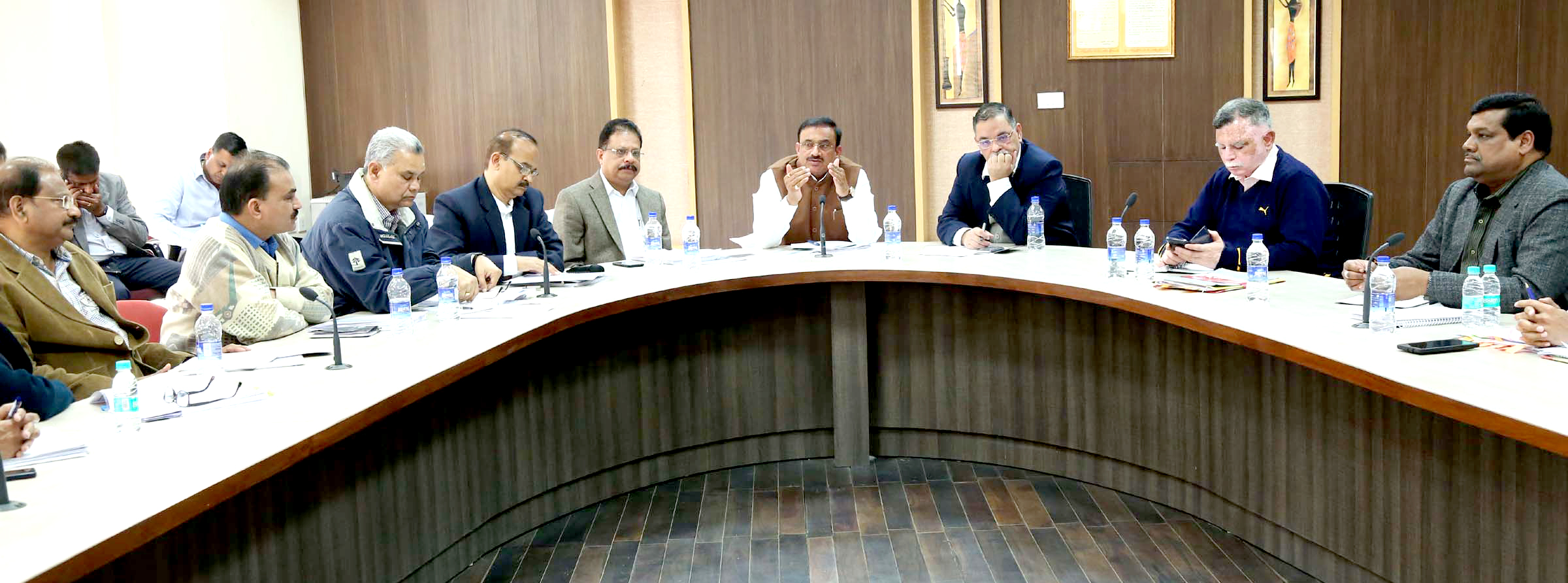 Action will be taken, if Permit Given to 15 Years Old Vehicles.
Action will be taken, if Permit Given to 15 Years Old Vehicles.
Bhopal:MMNN: 9 January 2018
A strict action will be taken against the concerned R.T.O. for giving permit to 15 years old school vehicles. R.T.Os must check vehicles by conducting field visits four days in a week. Moreover, a special checking campaign should be conducted till January 30. Minister for Home and Transport Shri Bhupendra Singh said this in a meeting of Transport and Police Officers. Minister Shri Singh mentioned that sufficient police force will be provided for the checking campaign. He further stated that speed governor and GPS must be of good quality. Numbers of children commuting in the vehicles should be fixed and the speed of school vehicles should not be more than 40 k.m. per hour. Training to the drivers should be imparted from time to time, he added. Shri Singh informed that a committee of Collector, Superintendent of Police and R.T.O. besides a committee of S.D.M. and S.D.O.P. has been made at district and sub-divisional level respectively. These committees will take proper steps in connection with the children’s safety after deliberating with the parents. He further said that the compliance of norms prescribed for the school buses must be ensured completely. Passenger Buses Must have Proper Timings Moreover, Shri Singh said that passenger buses must have proper timings to avoid race among them. There should not be a gap of less than 5 minutes during the departure of 2 buses. Regular checking of these vehicles must be conducted. Routes Formation Shri Singh said that formation of all the routes should be carried out by January 30. New permits will be issued as required after the formation. Principal Secretary Transport Shri Malay Shrivastava said that the participation of School Education Department will also be ensured in this campaign. Director General of Police Shri Rishi Kumar Shukla stated that the Police Department will fully cooperate in the campaign. Transport Commissioner Shri Shailendra Shrivastava mentioned that decision in connection to the schools’ autos and vans will be taken after the discussion with the parents. Senior Officers of Transport and Police Departments were present in the meeting
Our Correspondent, 5 January 2018
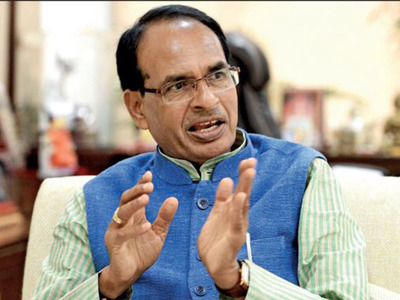
More and more students can take advantage of Chief Minister Meritorious Student and Talented Student Promotion Scheme by securing the highest marks in class XII of the board in Madhya Pradesh. 'Prerna Samvad' will be held in schools between January 15 and 30. Public representatives and officers will hold dialogue will students, visiting schools. School Education Department has directed collectors to make all necessary arrangements for 'Prerna Samvad'. 'Prerna Samvad' will be held with Classes 11 and 12 students. During this, students will be motivated to better results by giving information about Chief Minister Meritorious Student and Talented Student Promotion Scheme. Collectors have been told to decide schools and date of visit by holding talks with public representatives and officers. Collectors have been asked to ensure that the 'Prerna Samvad' will be held mandatorily in each school in the state. To make the dialogue successful, training programme has been organised on January 10 and 12. Training of teachers associated with class XI and XII will be organised on January 10 and district level orientation of public representatives and officers will he held on 'Yuva Diwas' on January 12. Officials of Technical Education Department have been asked to provide support in the training. Minister of State Government, MPs, District Panchayat President, MLA, Mayor, District and Nagar Panchayat Chairman and first and second class government officials will be included in Samvad programme. Collectors have been instructed to carry out constant monitoring of 'Prerna Samvad'. Meritorious Students Promotion Scheme The Meritorious Students Promotion Scheme is being run by Higher Education Department. The State Government is reimbursing fee of meritorious students for higher education. Fee equal to government college fee is provided to student on admission in any government and private engineering college if he or she secures 50,000 rank in JEE mains, by the state government. Fee of private college between Rs one lakh to five lakh or actual educational fee - whichever is less - will be reimbursed by the state government. Similarly, fee of medical education, law, graduation programme and education at graduation level will be borne by the state government. Students are eligible to get benefit under the scheme, whose family income is not more than Rs six lakh per year and they are state domicile. Students should score 75 percent marks in class XII of board of secondary education, Madhya Pradesh or 85 percent marks in CBSE examination. Talented Student Promotion Scheme Under this scheme, Rs 25000 cash and certificate is given to students of general category for scoring 85 percent marks in class XII and reserved category students for scoring 75 percent marks for purchasing laptop.
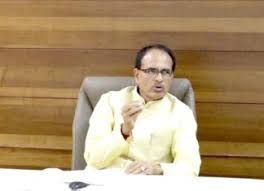 School Transport Arrangement must be Improved: CM Shri Chouhan.
School Transport Arrangement must be Improved: CM Shri Chouhan.
Bhopal:MMNN: 8 January 2018
Chief Minister Shri Shivraj Singh Chouhan gave strict instructions to the officers to improve transport arrangements for the school students. He said that the prescribed norms for vehicles, engaged in transporting children must be ensured. No negligence will be tolerated at any cost. He clearly stated that 15 years old school buses will not be operated in the schools. Moreover, automatic fitness centers should be established for testing these vehicles. CM Shri Chouhan held emergency meeting with the concerned officers at state hangar here today. He mentioned that directives to fix maximum life time of 15 years of the buses used for transporting students in the academic institutions should be issued immediately. Automatic fitness centers should be established to check the fitness of the buses automatically. School buses will have maximum speed limit of 40 k.m. per hour. If over speeding is found then action will be taken against the bus driver. Moreover, a decision has been taken to make a Centralised Data Center for improvement in speed governor and GPS. With the help of this center, the location and speed of the buses will be monitored that which bus is running more than the speed limit. This will help in controlling the speed of the buses. Shri Chouhan further mentioned that along with the officers of the transport department , the regular checking of buses used in academic institutions must be ensured through the officers of the Police department. The Chief Minister Shri Chouhan said that a committee must be formed at academic institute level with the participation of the parents for ensuring fitness of the buses engaged in transporting school children according to the prescribed norms. Moreover, to ensure such arrangement, a committee of district collector, superintendent of police and regional transport officer at district level and also a committee of sub-divisional officer (revenue) and sub-divisional officer (police) must be formed at sub-division level. Furthermore, Shri Chouhan mentioned that automatic driving test tracks must be prepared. In order to ensure safety of school children and keeping in view the capacity of the buses, the compliance of the norms should be ensured by fixing the maximum number of children. Suggestion to provide arrangement of seat belts in the buses must be given to all the educational institutions. Action to cancel recognition of the schools should be taken, if they do not follow the norms. Moreover, action should be taken to cancel the no objection certificate (issued by the state government) should be taken for schools affiliated with C.B.S.E./I.C.S.E. and other boards, if they do not follow the directives related to the safety of the children. Principal Secretary Transport Shri Malay Shrivastava, Principal Secretary to CM Shri Ashok Varnval, Principal Secretary Urban Administration Shri Vivek Agrawal, Principal Secretary School Education Smt. Deepti Goud Mukherjee and other officers were present in the meeting.
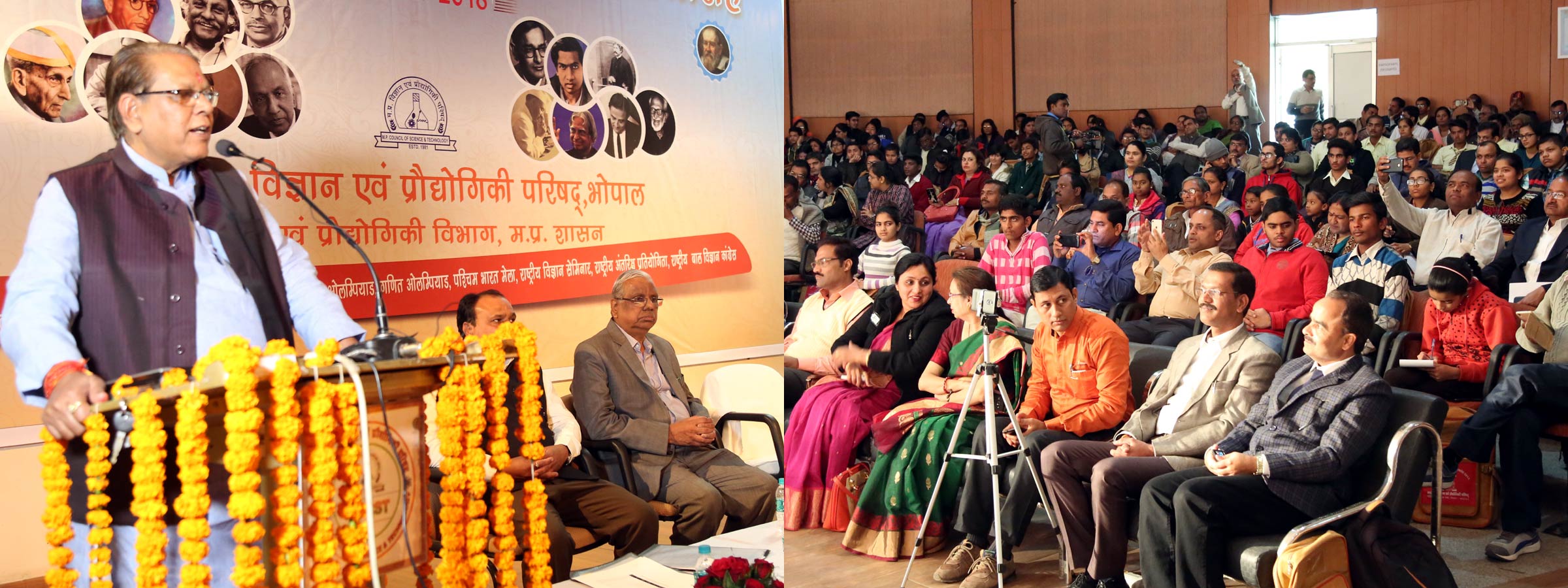 Send Models Prepared by Teachers to other Schools: Minister Shri Gupta.
Send Models Prepared by Teachers to other Schools: Minister Shri Gupta.
Bhopal:MMNN: 8 January 2018
Models prepared by the teachers must be sent to other schools also to encourage teachers and students for innovations. Minister for Science and Technology Shri Umashankar Gupta said this during the Madhya Pradesh Vigyan Pratibha Samman Samaroh held at MAPCOST. Shri Gupta also saw the models prepared by the innovative teachers. He mentioned that scientific facts of India, which are hidden, should be brought into the light. Teachers must encourage the students for new experiments. He further said that there is some scientific base behind our festivals. Shri Gupta honoured 3 innovative teachers, 50 participants of junior Science Olympiad, 50 of senior Science Olympiad, 35 of regional Maths Olympiad, 8 of West India Science Fair, one participant who represented Madhya Pradesh in Nehru Science Center –Mumbai, 30 of National Children’s Science Congress and 3 participants who represented Madhya Pradesh in Space Science Competition organised by ISRO at Hyderabad. Innovative teachers namely Dr. Lalit Mehta of Ratlam, Mohd. Shahid Ansari of Chhindwara and Dr. Bharti Diwedi of Bhopal were also honoured. Under the student individual category Shri Pawan Bairagi of Sehore, Shri Siddhartha Chouhan of Ujjain and Shri Yash Shukla of Dewas beside other teachers and students under various categories were honoured on the occasion. Director General of MAPCOST Shri Navin Chandra informed about the activities being undertaken for the publicity of science. Scientists Dr. R.K. Arya and Dr. Sunil Garg also expressed their views. Teachers and students of various districts were present in the programme.
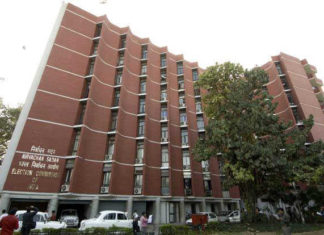 MSME Department to provide financial assistance for industrial development.
MSME Department to provide financial assistance for industrial development.
Bhopal:MMNN: 8 January 2018
Forty percent of investment in plant and machinery will be given to Micro, Small and Medium manufacturing Enterprises in the form of industry development grant in 5 equal annual installments. The MSME Department has provided this facility to all units except 22 marked ineligible units. Giving information in this regard, Principal Secretary, MSME, Shri VL Kantaroa said that according to the provision made in the MSME Development Policy 2017, if the investor purchases private land to set up a medium-class manufacturing enterprise, such units will be provided 50 percent of expenditure on infrastructure for water, road and electricity upto maximum Rs 25 lakh. Twenty percent of the amount, maximum Rs 2 crore, spent in the establishment / development of private industrial area / multi-storey industrial complex will be provided to private sector. Industrial area should be on minimum 5 acres land. The carpet area should be at least 10 thousand square feet in the case of multi-storey industrial complex case. It is compulsory that the multi-storey industrial complex should have 5 units. Fifty percent capital grant, maximum Rs 25 lakh will be availed to industrial units for investment in establishing waste management systems (ETP, STP)
Our Correspondent, 5 January 2018
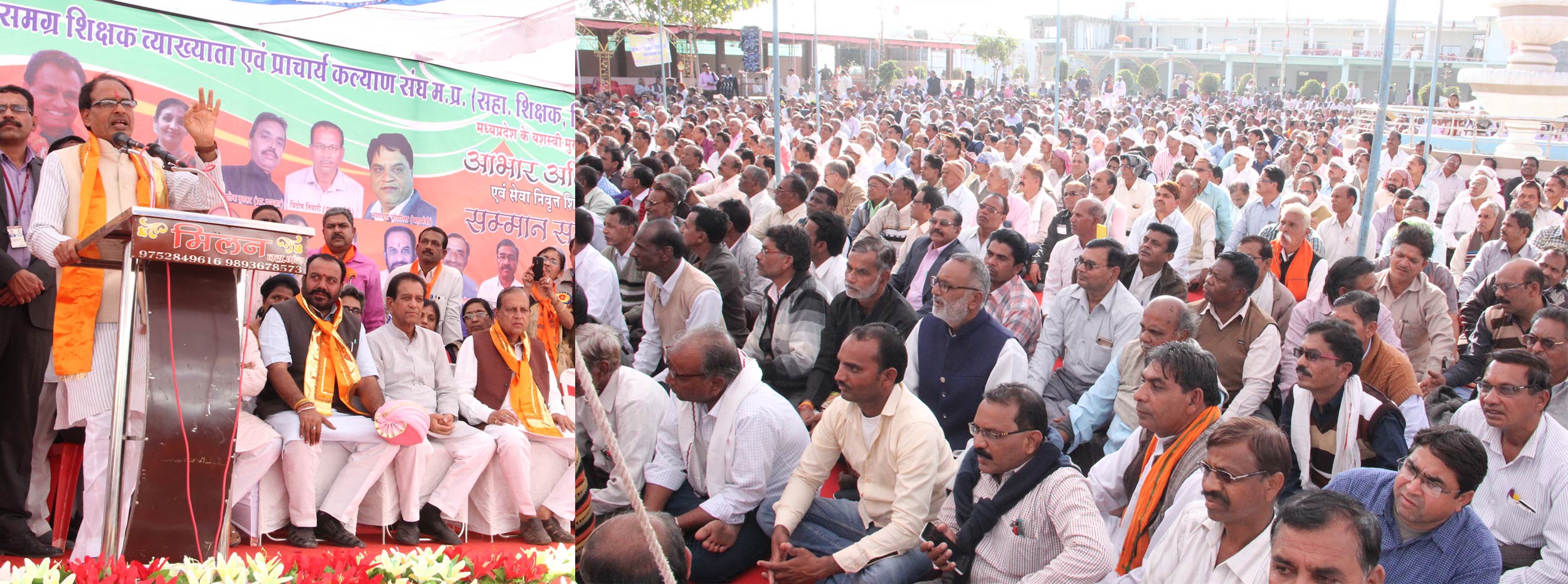
Minister for School Education Kunwar Vijay Shah has described the bus accident of Delhi Public School of Indore as unfortunate. Minister Kunwar Shah gathered information from the officers of the school education department and officers of the education department posted at Indore immediately after receiving the news of the accident. Minister Kunwar Shah has expressed profound condolences to the parents of the children, who lost their lives in the accident. He mentioned that a strict action will be taken against the culprits by conducting a thorough enquiry through senior officers of the school education department
Our Correspondent, 23 December 2017

Chief Minister Shri Shivraj Singh Chouhan has said that the order related to change in designations of teachers will soon be released. Seniority of teachers would not be violated. He told the teachers to pay serious attention to studies of students so that maximum number of students are able to avail maximum benefits of Medhavi Chhatra Protsahan Yojana. CM Shri Chouhan was addressing a felicitation ceremony organized at Nasrullaganj by the Integrated Teacher, Lecturer and Principals Welfare Association today. Teachers and Assistant Teachers who have completed 30 years of service thanked and honoured the Chief Minister for approving Upper Pay Scale. CM Shri Chouhan said that teachers build the new generation. The contribution of teachers in building the new state will remain unforgettable. Shri Chouhan told the teachers to pave the way towards a bright future of students through teaching. The Chief Minister felicitated retired teachers at the felicitation ceremony. Those who were present on the occasion included Sehore district minister in charge Shri Rampal Singh, MARKFED Chairman Shri Ramakant Bhargav, Forest Development Corporation Chairman Shri Guruprasad Sharma, District Panchayat President Smt. Urmila Maretha, senior administrative officer and a large number of teachers.
Our Correspondent, 18 December 2017
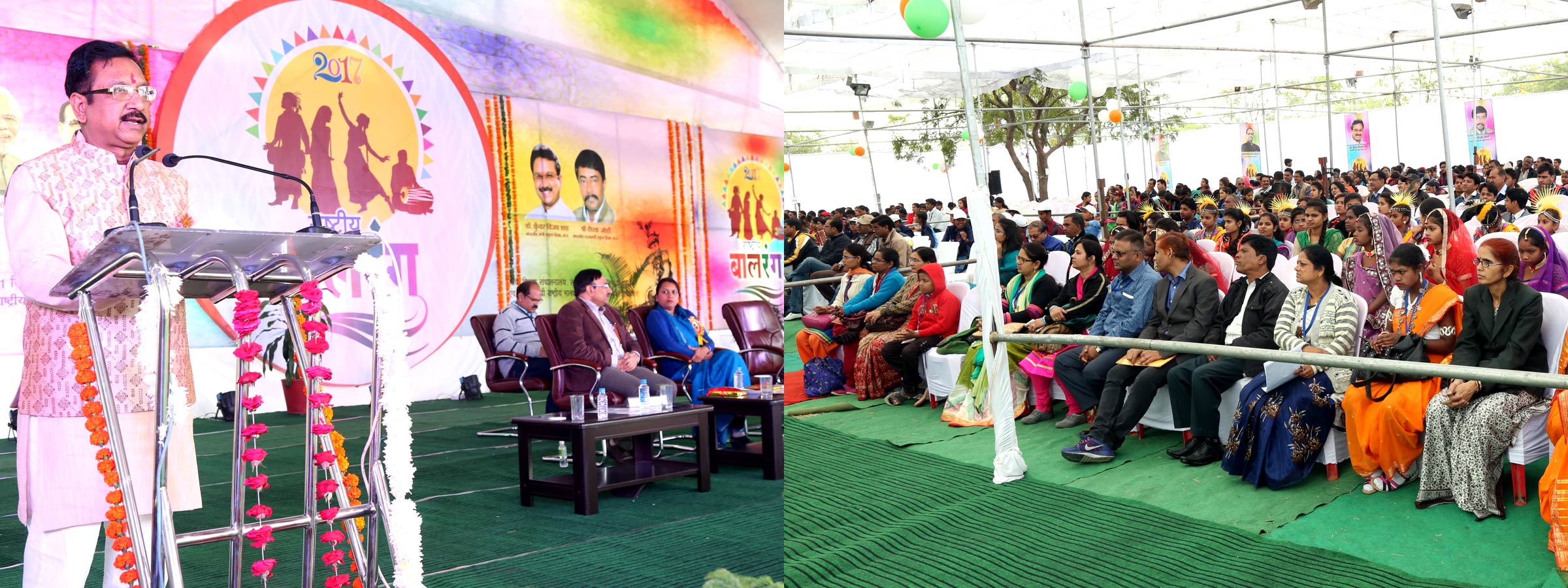
School Education Minister Kunwar Vijay Shah said that with the success of Rashtriya Balrang in Bhopal in the last few years, it has emerged as a powerful platform for talented school students to give cultural performances. He told the students taking part in the Samaroh to give cultural and literary performances with full enthusiasm. Kunwar Shah was addressing the three-day Rashtriya Balrang Samaroh organized at Indira Gandhi Rashtriya Manav Sangrahalaya on Shyamala Hills in Bhopal today. The minister said that the help of 118 government high schools will be taken in the first phase to promote school band in Madhya Pradesh. As many as 550 school children from 26 states and nearly 10 thousand students from schools of the state will take part in the samaroh. Kunwar Shah said at the inaugural programme that people will get an opportunity to know about the varied culture of the country from the children coming for the Balrang from various states. He told the students about the importance of cleanliness in life. He later visited the school band competition site. Bands give us a lesson on discipline also apart from music. School bands have been included in the form of competition for the first time in Balrang Samaroh. Director of Rashtriya Manav Sangrahalay Shri Sarit Kumar Choudhury said that Manav Sangrahalay is identified as a siginificant centre to understand human heritage in the whole country. Students who come here will be able to enhance their knowledge. Director Public Instructions Smt. Anju Pavan Bhadouria gave information about the activities to be organized at the Balrang Samaroh. He said that the objective of Balrang is to introduce school students too national unity and the culture and heritage of various states. The students have benefitted from this event being organized since last 11 years. He told that the samaroh was first organized on January 26, 1996. From 2005, it turned into a national event. School students from 13 states, 8 northeastern states and 5 Union territories are taking part in the Rashtriya Balrang Samaroh. The samaroh will comprise cultural and literary competitions in both junior and senior category. Apart from Madrasas and Sanskrit school, special competitions are being held for differently abled students also. The main attraction at the samaroh will be folk-dance. Students will give cultural performances of their states through folk dances. Prizes for the winning teams include Rs 51,000 (first prize), Rs 31,000 (second) and Rs 21,000 (third).
Our Correspondent, 15 November 2017
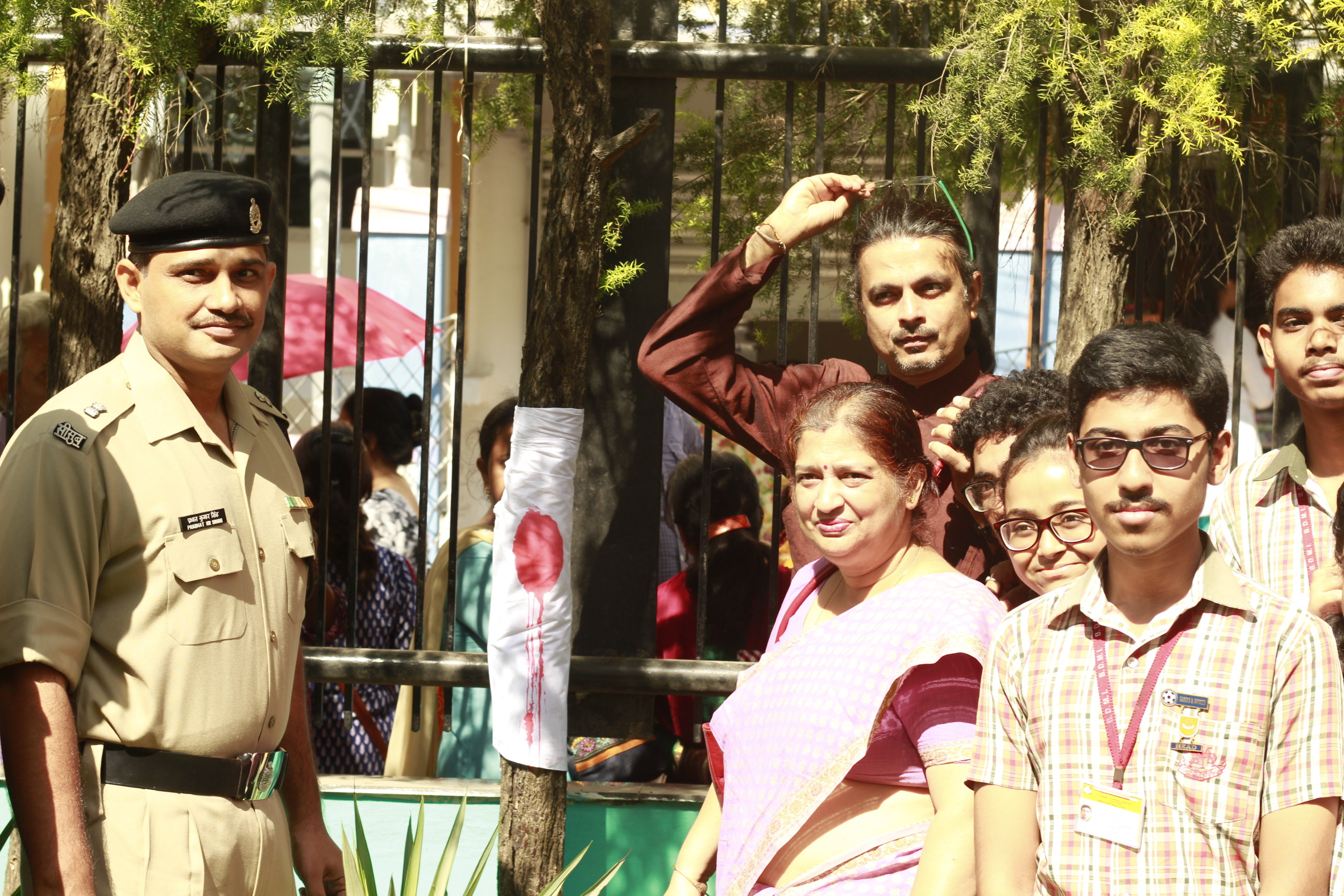
B.D.M International School undertook an art initiative Bandaging the Tree within the precincts of its school premises today. The vision behind the art initiative is to bring to light the apathy at large towards the environment and to create awareness of the sorry state of one of our citys silent warriors... Our Trees!. They are testified to be living organs, and are hurt if damaged due to various reasons, be it breaking or damaging of branches or any other part. The pain they suffer is not felt, and slowly they wilt to death with passage of time causing terrible damage to the environment. The art initiative is to create awareness about the pain the trees suffer & the importance of nursing them back to health, thus saving the environment from further damage. Students of the school selected trees around the premises reasons and bandaged them with a white cloth with red color paint sprinkled on the middle, to drive & highlight a key environment message. According to the School Principal, Mrs. Vijaya Chaudhuri, In todays world, preoccupation with digital media, internet and mobile phones, has become a big barrier between children and nature. We have noticed that most urban children are ignorant about matters related to the environment, which in the long run will be very damaging for the same. This, of course, is the case as most parents are too busy trying to provide good lives for their families The thought of organising the initiative came from the above, she added. Bandaging the Tree is part of the The Heal Project an art initiative by well known Mumbai based artist Kisalay Vora and Sheena Sahani Vora. They have been very successful in initiating the experiment in Multiple city locations, creating huge public awareness. Kisalay was personally present to guide and curate the initiative to the students and teaching staff of the school. He is very happy to be part of the event and looks forward to more such initiatives in association with the school. The school children were full of energy and excitement in their participation, Jawans and a Senior Officer from BSF were present to support &encourage the children in this art iniative
Our Correspondent, 22 May. 2017

Minister for School Education Kunwar Vijay Shah said that weekly review will be made now through video conferencing in order to bring improvement in Board Examination results. He directed the District Officers to make inspection process of government schools more effective for qualitative improvement in school education. Minister Kunwar Shah was addressing the State Level meeting of District Officers at Academy of Administration today. Minister of State for School Education Shri Deepak Joshi was present in the meeting. District wise review of board examination results of class 10th and 12th was made in the meeting. Kunwar Shah mentioned that teachers which are attached for non academic works in the state should be relieved till May 31st at any cost for their postings in schools. He directed the District Education Officers to make such arrangements in the districts that teachers should not be entrusted with non academic works. He instructed for writing a letter again at the state level to the District Collectors in this regard. Moreover, Kunwar Shah told to implement 'Gyanarjan' project which is being implemented in Mandla and Raisen districts in the entire state. There is an arrangement for monitoring class 10th and 12th syllabus after dividing it on daily basis through software under the 'Gyanarjan' project. Remarkable improvement was registered in the board examination result of class 10th and 12th in these two districts. Furthermore, Kunwar Shah also said to pay attention towards education of disabled children and their hostel arrangements. Minister of State for School Education Shri Deepak Joshi stated that improvement in board examination results could be obtained in a better way from suggestions received from Field Officers. He also told to ensure regular presence of teachers. Deliberations on status of school education at middle level, action plan on quality in education, free cycle scheme, building construction, CM Helpline cases and integrated scholarship schemes were made in the meeting. Secretary School Education Smt. Deepti Gour Mukherjee issued directives for conducting regular parents' meeting in government schools for qualitative improvement. Commissioner Public Instructions Shri Neeraj Dubey gave directives to bring improvement analyzing board examination results. Director State Education Centre Shri Lokesh Jatav suggested for working with a team spirit at state, district, block and center level for qualitative improvement in education. Joint Director School Education Divisional office, District Education Officers and Project Coordinators District Education Centre were present in the meeting.
Our Correspondent, 13 Aug. 2015
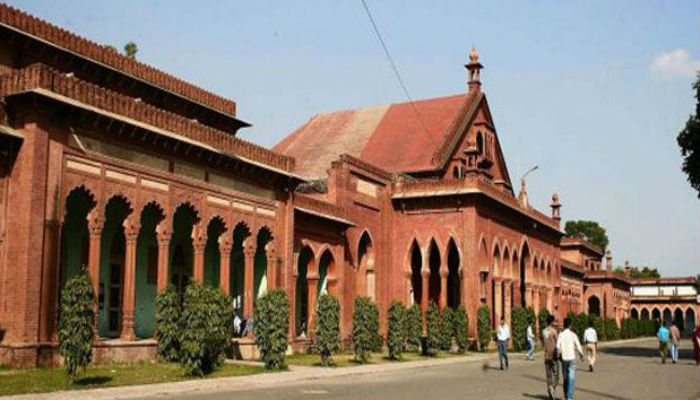 Bhopal : The state government has directed district collectors to ensure arrangements for 10 English medium schools in their respective district.
Bhopal : The state government has directed district collectors to ensure arrangements for 10 English medium schools in their respective district.
They have been directed to open schools of class I to X to impart quality education in English language.
In the first phase this year, 5 middle schools each will be opened in all districts.
Remaining 5 middle schools will be opened in the second phase in year 2016-17.
English medium text-books are being made available.
Our Correspondent, 20 May 2015
 Dr. (Mrs.) Bhavna Gupta, Principal of Asnani Pearson School, Bhopal honoured with prestigious “ Pearson Excellence Award”. The award is given annually at the Pearson Annual Conference to promote leadership quality to reward the deserving schools, principals and area heads for their work over the annual academic season. The forum, where Pearson School leaders come together, learn and share good practice and they get to enhance their leadership skills by interacting with Domain Experts. Mrs. Gupta was awarded for her excellent performance amongst the peers from all over the country.
Dr. (Mrs.) Bhavna Gupta, Principal of Asnani Pearson School, Bhopal honoured with prestigious “ Pearson Excellence Award”. The award is given annually at the Pearson Annual Conference to promote leadership quality to reward the deserving schools, principals and area heads for their work over the annual academic season. The forum, where Pearson School leaders come together, learn and share good practice and they get to enhance their leadership skills by interacting with Domain Experts. Mrs. Gupta was awarded for her excellent performance amongst the peers from all over the country.
Pearson Schools is a part of Pearson, the world's leading learning company. With over 21,000 students across 18 cities in the country, Pearson Schools is one of the fastest growing chains of schools in India with the vision to create future-ready global youth who will enhance society through their scholastic achievements, exceptionally honed life skills and holistic overall development.
Mr. Jaisooraj Nambiar, Chairman, Asnani Pearson School, Bhopal said that " Our School principal Dr. (Mrs.) Bhavna Gupta is a hard working, proactive and blessed with excellent leadership quality, whose primary focus is to serve the school to its best. Due to her friendly and loving nature teachers as well as students find her company the best. Because of the easy approach, personality, she finds it easy to communicate with both the students and teachers about the academic milestones to be endeavoured. Asnani School gained high reputation under her leadership".
On receiving this award Dr. (Mrs.) Bhavna Gupta said, "I feel very proud yet thankful to have earned this reward. I would like to thank my hard-working staffs and students to help me achieve the goal I always dreamt of. I shall keep working for the betterment of school management and development of overall growth of the student studying here".
Pearson Schools manage, operate and deploy the best infrastructural facilities and provide tremendous opportunities for students to excel in academic, literary, social and cultural skills alike.
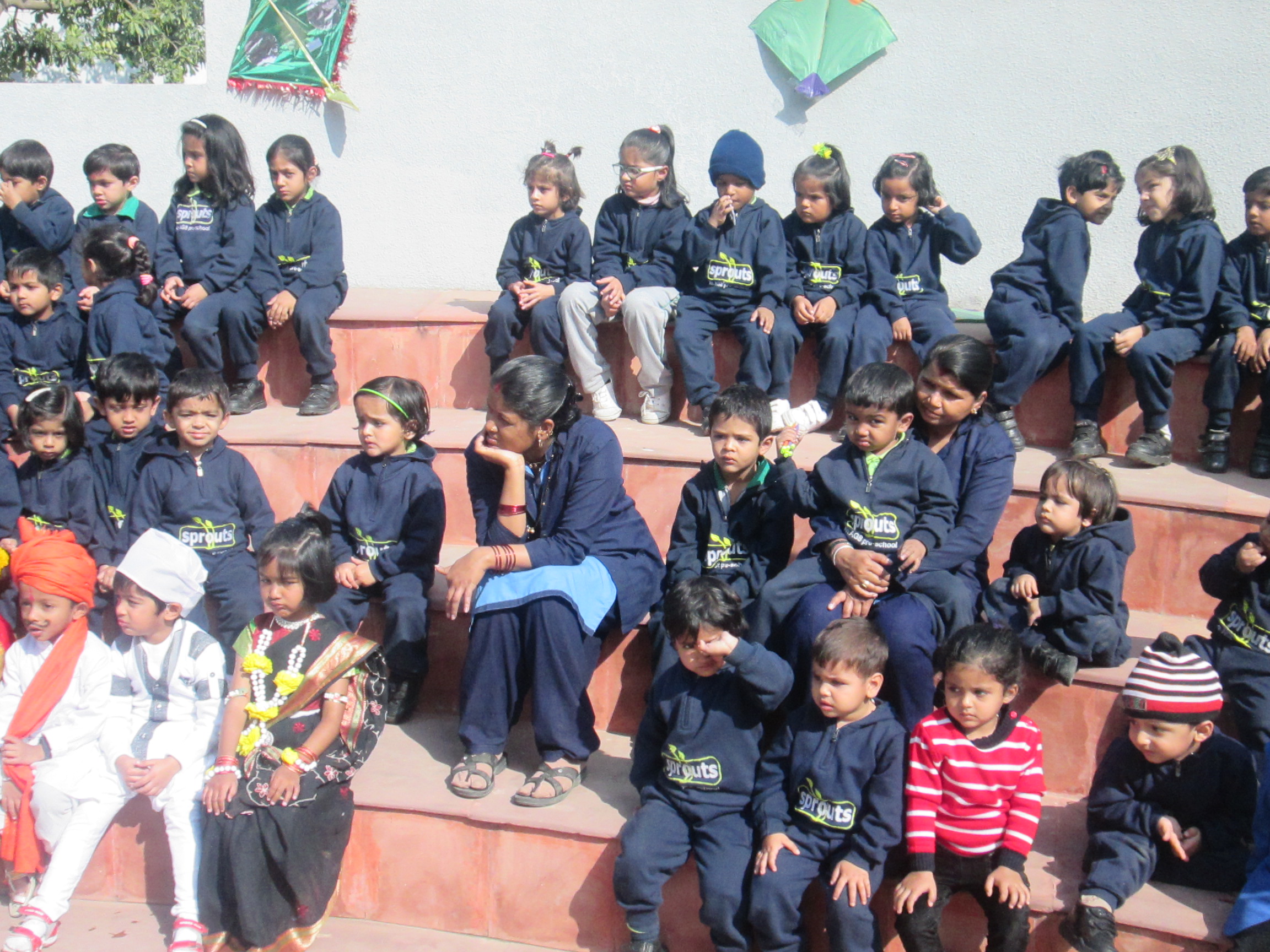 Pongal, Lohri & Makar Sankranti were celebrated with enthusiasm and happiness at the Sprouts’ Aakriti Pre-School to imbibe the cultural versatility among the kids Pongal is one of the most popular festivals which are mainly celebrated in the southern regions of India.
Pongal, Lohri & Makar Sankranti were celebrated with enthusiasm and happiness at the Sprouts’ Aakriti Pre-School to imbibe the cultural versatility among the kids Pongal is one of the most popular festivals which are mainly celebrated in the southern regions of India.
The day of the celebration of Pongal festival coincides with the Makar Sankranti which is a Hindu festival and it is celebrated all over India. Another festival, which clashes with these two celebrations is the Lohri festival, which is famous in Punjab.
These festivals are celebrated with great pomp and grandeur in the states of India. These three are the winter festivals which are enjoyed by the people all over the country. In fact the schools also celebrate these festivals.
Supriya Singh, Centre Head, Sprouts School said that this day is very auspicious for all of us, and in order to make the toddlers aware of our rich and varied cultural heritage, the festivals were celebrated with proper rituals with creation of actual atmosphere.
The children were briefed about all the three festivals. The teachers and kids were dressed up in traditional dress, which made the atmosphere colorful. There was the fire for the Lohri, around which the kids walked and worshipped, sugarcane with mud pongal pot represented the pongal. Bhangra and gidda performance by teachers and kids added to the festivity.
Til gud, popcorns and peanuts made the celebration complete. The celebration concluded with the flying of colorful kites soaring high in the sky.
 The National Focus Group’s position paper on ‘Teaching of Science’ a component of National Curriculum Framework-2005 states that a major area of concern is the gradual decline of practical work and experimentation at secondary and senior secondary levels, Considering this concern, the Rashtriya Madhyamik Shiksha Abhiyan (RMSA) Framework, 2009 provides for an integrated science laboratory for the secondary schools. Further, National Council of Educational Research and Training (NCERT) has developed activity based teaching learning materials, the textbooks, laboratory manuals, teachers handbook and science kits that promotes enquiry, critical and analytical thinking at the secondary stage. NCERT has also been building capacity of Key Resource Persons (KRPs) in science at the secondary stage in all the states/UTs.
The National Focus Group’s position paper on ‘Teaching of Science’ a component of National Curriculum Framework-2005 states that a major area of concern is the gradual decline of practical work and experimentation at secondary and senior secondary levels, Considering this concern, the Rashtriya Madhyamik Shiksha Abhiyan (RMSA) Framework, 2009 provides for an integrated science laboratory for the secondary schools. Further, National Council of Educational Research and Training (NCERT) has developed activity based teaching learning materials, the textbooks, laboratory manuals, teachers handbook and science kits that promotes enquiry, critical and analytical thinking at the secondary stage. NCERT has also been building capacity of Key Resource Persons (KRPs) in science at the secondary stage in all the states/UTs.
At the school level, Central Board of Secondary Education is currently offering various skill based courses at secondary and senior secondary levels to impart knowledge and training that strengthens the core skills of the students from Class IX onwards. The Board has also identified some Skill Knowledge Providers for effectively offering the skill based courses in the schools. The Board is also working for the industry linkages specially meant for the schools and would prepare student database for appropriate internship training /employment.
The Government has taken various initiatives to promote vocational education and training like the development of the National Vocational Education Qualifications Framework (NVEQF) and later its assimilation in the National Skills Qualification Framework (NSQF). The University Grants Commission (UGC) has framed guidelines for adoption of Choice-Based Credit System (CBCS) for skill development for all undergraduate and postgraduate level degree, diploma and certificate programmes under the credit system awarded by Central, State and Deemed to be Universities.
This information was given by the Union Human Resource Development Minister, Smt. Smriti Irani in a written reply to the Rajya Sabha question.
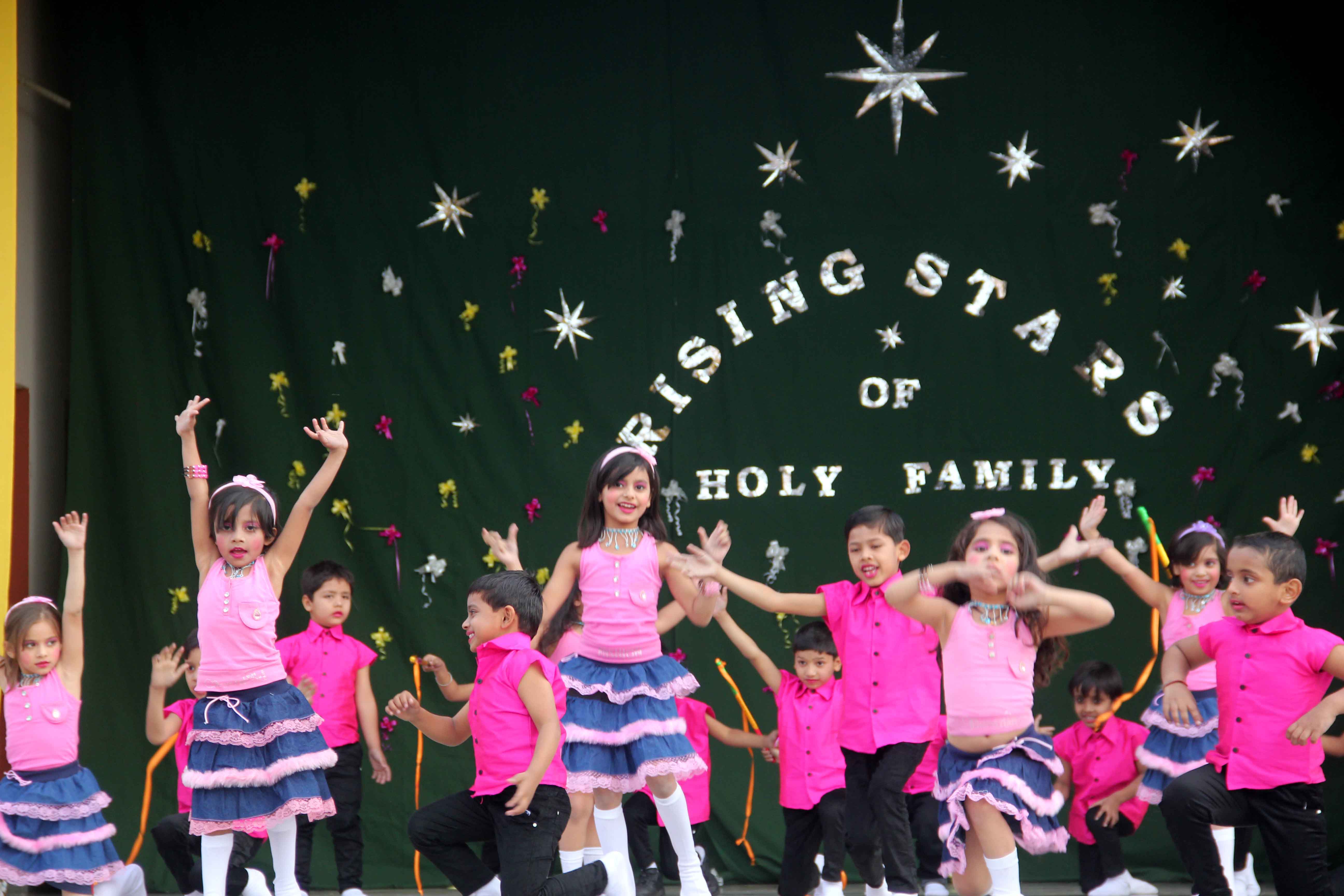 In the lieu of Silver Jubilee Celebrations, Holy Family Convent Sr. Sec. School Celebrated the ‘do andlearn’ program for Tiny Tots of Mariam Thresia Kinder Garten, adding one more feather in theholyfite’s cap in this Silver Jubilee year, with the name ‘Rising Stars’.
In the lieu of Silver Jubilee Celebrations, Holy Family Convent Sr. Sec. School Celebrated the ‘do andlearn’ program for Tiny Tots of Mariam Thresia Kinder Garten, adding one more feather in theholyfite’s cap in this Silver Jubilee year, with the name ‘Rising Stars’.
The swirling, glittering facesof the Kindergarten kids made everyone spell bound.The Chief Guest of the occasion was Mr. Thomas Joseph, Pvt. Secretary of Governor, M.Paccompanied by his family.
The programme started with lighting of the auspicious lamp by the ChiefGuest, Rev. Sr. Rosiline Jose the Principal, Sr. Alphy Maria in charge- Mother Mariam ThresiaKindergarten Wing.
Sr. Rosiline Jose, welcomed all the guests, specially the parents of the Mariam Thresia KinderGarten saying “It is with your cooperation and love for your dear ones the event has made possibletoday. I welcome one and all to witness your ‘rising stars’ as they perform their world of surprise,laughter and merry”.
The foot tapping performances by the little kids made the audience mesmerized.Their tender and glowing faces of the little ones looked beautiful when they performed on varioussongs like wakka - wakka, dhol baje, happy times, smile dance, and group song etc. Christmas carolswere sung to greet the audience to greet all the guests and all shared Xmas joy with cakes.
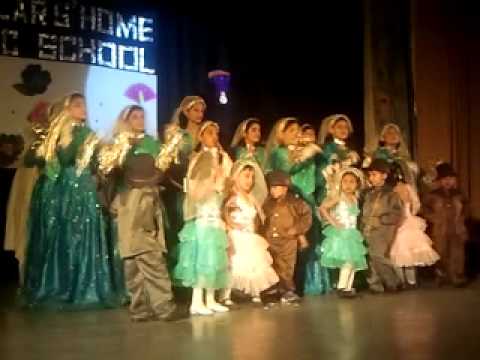 Bhopal: Annual day celebration of Carmel Convent BHEL'S KG section-glitterz was held on Monday. Celebrations commenced with invocation to God .Principal Sr Pavithra welcomed chief guest Sarvesh Chaturvedi, GM, HR,BHEL, guest of honour Sr Noel, provincial superior, Mount Carmel province,Bhopal,and parents.Programmes such as fantasy,colours of MP and melody of harmony highlighted the commitment of the school towards empowerment of students. 'Saathi Hath Badhana' underscored women's empowerment in Multai village,MP.
Bhopal: Annual day celebration of Carmel Convent BHEL'S KG section-glitterz was held on Monday. Celebrations commenced with invocation to God .Principal Sr Pavithra welcomed chief guest Sarvesh Chaturvedi, GM, HR,BHEL, guest of honour Sr Noel, provincial superior, Mount Carmel province,Bhopal,and parents.Programmes such as fantasy,colours of MP and melody of harmony highlighted the commitment of the school towards empowerment of students. 'Saathi Hath Badhana' underscored women's empowerment in Multai village,MP.
DPS Annual sports meet
Annual sports meet was celebrated on December 5 at Delhi Public School(DPS)Kolar Road on the theme 'Lakshay'.Chief guest was Jaishre Acharya, member, managing committee, DPS.
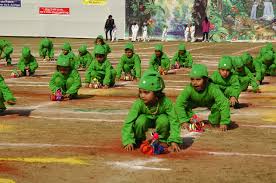
Welcomes song 'enticing chorale' was rendered by the school choir followed by horse show 'equine laureate'. Class VIII-IX students participated in various track and field events. Excellent blend of various sports such as cricket, chess, swimming, and horse-riding left audience spell-bound.
25 YEARS OF BLESSINGS
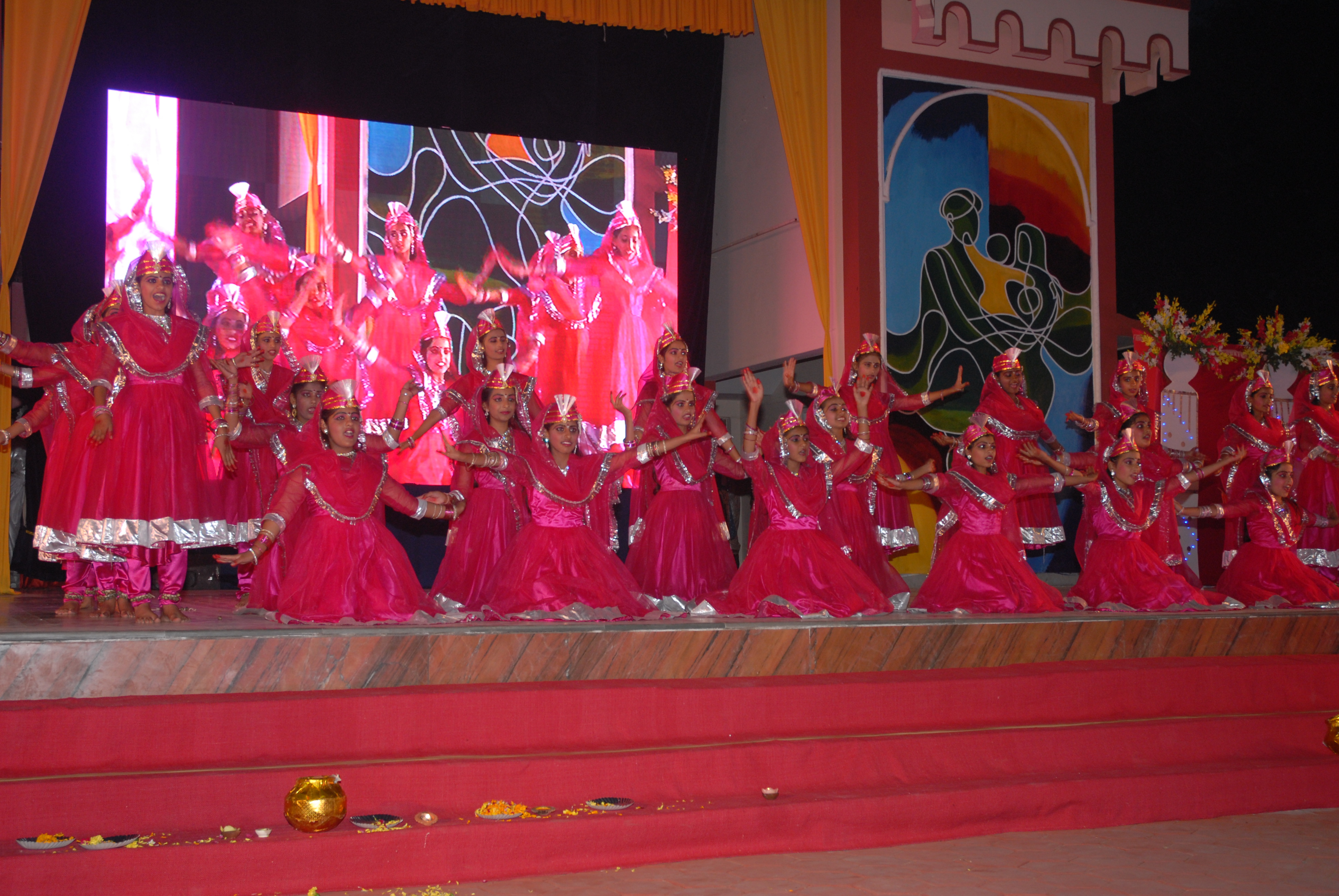 It is indeed a matter of great pride and honor for the Holy Family Convent Sr. Sec. School, Bhopal as it completes 25 glorious years after its foundation in 1990. The school has earned considerable appreciation for providing value-based quality education and developing personalities by imparting ideals of academic excellence, sense of discipline and high moral and ethical values.
It is indeed a matter of great pride and honor for the Holy Family Convent Sr. Sec. School, Bhopal as it completes 25 glorious years after its foundation in 1990. The school has earned considerable appreciation for providing value-based quality education and developing personalities by imparting ideals of academic excellence, sense of discipline and high moral and ethical values.It is our joy to announce our Jubilee year. Apart from many other special programs conducted this year, the Silver Jubilee function would behold everyone.
Rt. Rev. Dr. Leo Cornelio, the Arch Bishop of Bhopal inaugurated the programme. Dr. Sr. Bhavya CHF-Provincial Superior Shantidhara Province (Delhi), Shri Rameshwar Sharma, Honorable M.L.A. (Huzoor), Rev. Sr. Ruby Joseph, Ex-Provincial Shantidhara Province (Delhi) and Rev. Sr. Liya Peter, Councilor for Education, Shantidhara Province (Delhi) also present on the occasion as the guests of honor.
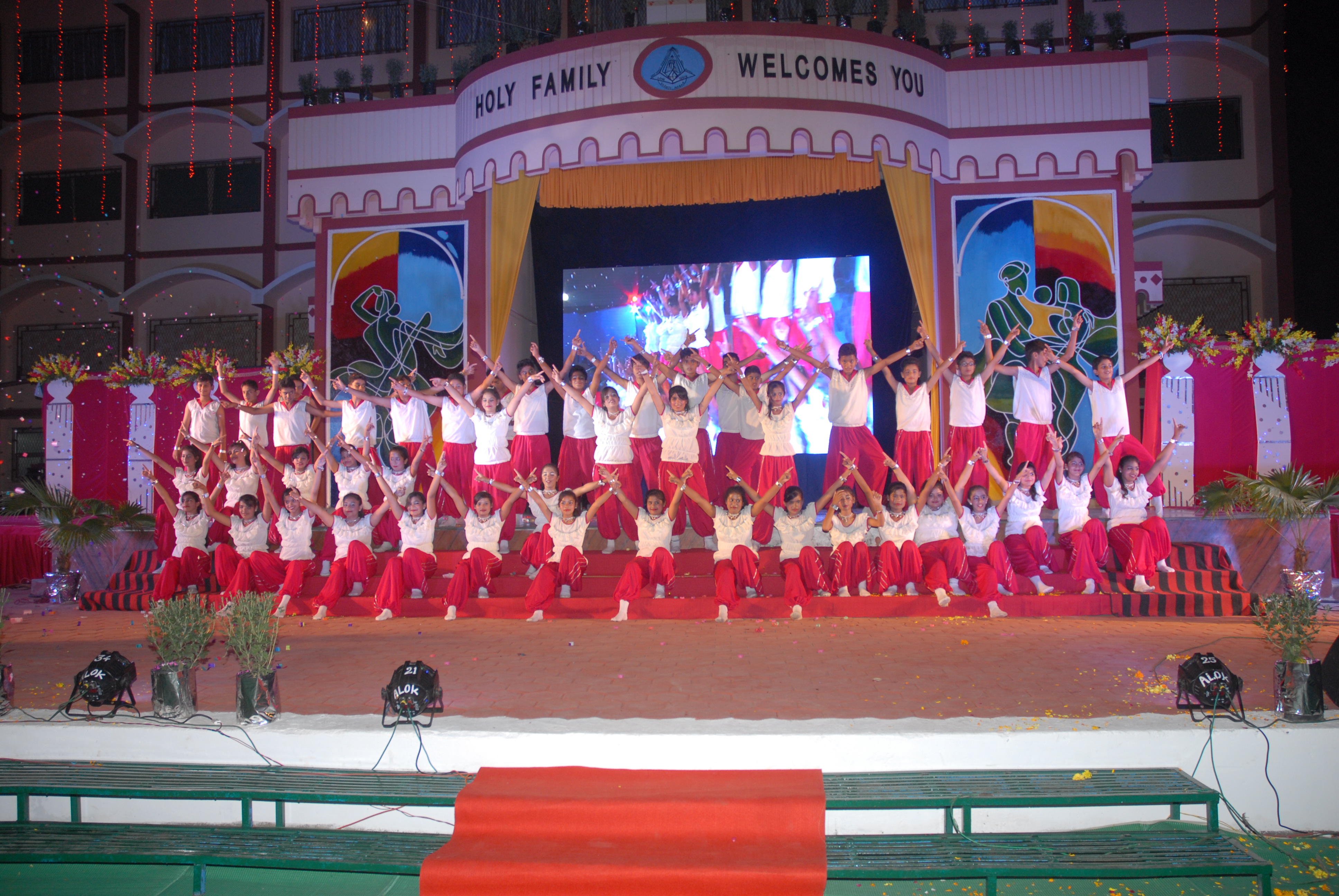 Dr. Leo Cornelio, ArchBishop of Bhopal said “ The completion of twenty-five years is indeed a major milestone in the life of an educational institution. Holy Family Convent Sr. Sec. School, since its foundation in 1990, has earned very considerable appreciation for providing value-based education and for imparting the ideals of academic excellence, sense of discipline and high moral and ethical values, leading to the development of integrated personalities”.
Dr. Leo Cornelio, ArchBishop of Bhopal said “ The completion of twenty-five years is indeed a major milestone in the life of an educational institution. Holy Family Convent Sr. Sec. School, since its foundation in 1990, has earned very considerable appreciation for providing value-based education and for imparting the ideals of academic excellence, sense of discipline and high moral and ethical values, leading to the development of integrated personalities”.Sr. Roseline Jose , Principal, Holy Family Convent Senior Secondary School Bhopal said “ The live orchestra with Rajasthani and Kathak dances is a first time effort to welcome all the invitees, dignitaries and guests. The whole program revolved around the theme of ‘Building Families, Building Nation’. Another inspiring program was the skit ‘Family, the mould of life’ laying stress on the need of values inculcated and expanded in the family and school. The message of Jubilee was the core of each dance and song items of the day.
The Toppers of Class XII (11 batches till 2014), the senior-most teacher (Mrs. Meenakshi Sehgal) and other teachers who have completed 20 and more years of service in the school was honored with mementos.The former Principals, Managers, Co-ordinators also joined the spectacular function.
Children are the nation’s assets. They are future citizens of India. The investment in children helps for human resource development of the country. A happy child will make his/her home and the country happy. The future of any country depends upon the right upbringing of its children, for which a congenial environment and adequate opportunities for wholesome development are essential. According to UNICEF’s Report 2013 “The State of the World’s Children,” one-third of the world’s children lack adequate shelter, 31% lack basic sanitation and 21% have no access to clean, potable water. Illness, malnutrition, and premature death are common when children lack the most basic protection. Children have a right to entertainment and they should be brought in healthy environment. The schools will organise excursions for children to promote their interaction with the nature and to gain field experience outside school and home. The school children also will be taken to the science museums to create awareness about science and technology developments. There are children courts in Goa. During the armed conflicts anywhere in the world children are the victims of the violence. There are several World level initiatives like UN Convention on Child Rights, UNICEF etc working for protection of human rights of children. India has provided constitutional rights and enacted several laws for protection of children. Juvenile justice is one such aspect. Measures like National Policy on Children, Integrated Child Protection Scheme, National Commission On Protection Of Child Rights, Prohibition Of Child Labour, establishment of Children’s Film Society, organising International Children’s Film Festival Of India, National Bal Bhawans etc facilitate welfare of children. Children parks, children sports and films are necessary for promoting health and entertainment of children. Understanding child psychology is necessary for formulating policies for children. President of India give away Child Awards for encouraging brave children. Children’s Day is being observed across the country on 14th November every year.
HUMAN RIGHTS OF CHILDREN
All human rights are also the human rights of children with particular attention to the rights of special protection and care afforded to minors, including their right to association with both parents, human identity as well as the basic needs for food, universal education, health care and criminal laws appropriate for the age and development of the child, equal protection of the child's civil rights, and freedom from discrimination on the basis of the child's race, gender, sexual orientation, gender identity, national origin, religion, disability, color, ethnicity, or other characteristics. Interpretations of children's rights range from allowing children the capacity for autonomous action to the enforcement of children being physically, mentally and emotionally free from abuse, physical and psychological. "
CONSTITUTIONAL RIGHTS OF CHILDREN
The Preamble of Indian Constitution states that Justice, liberty, equality, and fraternity for all the citizens including children are the fundamental philosophy of the Constitution. Article 14 deals with Equality before law and equal protection of laws. It is available to every person including children. Article 15 (3) empowers the State to make special legal provision for children. It provides mandate to the government to ensure children’s welfare constitutionally. Article 21 (A) ensures free and compulsory education for all the children in the age group of 6- 14 years. Based on 86th Constitutional Amendment Children’s Right to Education Act 2009 was enacted. Article 23 imposes total ban on forced labour and is punishable under the Act. Article 24 prohibits employment of children below the age of 14years in hazardous industries like mines, match industries etc. Article 51 A clause (k) and (j) states that the parent or the guardian’s responsibility to provide opportunities for education to his child or as case may be ward between the age of 6- 14 yrs. The directive principles in Constitution of India also provide protection for the children under Article 39 (e), Article 39 (f), Article 41, Article 42, Article 45, and Article 47.
UN CONVENTION ON CHILD RIGHTS (CRC 1989)
The important rights that CRC accords to the children are the right to survival and development, the right to freedom of expression, the right to freedom of association and to freedom of peaceful assembly; the right to the protection; the right to access to information; the right to protection against all forms of injury and maltreatment; the right to attain the highest standard of health; the right to adequate standard of living; the right to primary education; the right to rest, leisure and play; the protection from economic exploitation; the right to protection from the sexual exploitation and the right to protection and care affected by an armed conflict. The Convention further entails duty on the States Parties to provide free and compulsory primary education and suitable alternative care should be provided to parentless children. It recognized that, in all countries in the world, there are children living in exceptionally difficult conditions, and that such children need special consideration and further emphasized the importance of international co-operation for improving the living conditions of children in every country in particular in the developing country.
UNICEF
The United Nations Children's Fund is a United Nations Program headquartered in New York City that provides long-term humanitarian and developmental assistance to children and mothers in developing countries. It is one of the members of the United Nations Development Group and its Executive Committee. UNICEF was created by the United Nations General Assembly on December 11, 1946, to provide emergency food and healthcare to children in countries that had been devastated by World War II. In 1953, UNICEF became a permanent part of the United Nations System and its name was shortened from the original United Nations International Children's Emergency Fund but it has continued to be known by the popular acronym based on this previous title. UNICEF relies on contributions from governments and private donors. Governments contribute two thirds of the organization's resources; private groups and some 6 million individuals contribute the rest through the National Committees. It is estimated that 91.8% of their revenue is distributed to Program Services. UNICEF's programs emphasize developing community-level services to promote the health and well-being of children. UNICEF was awarded the Nobel Peace Prize in 1965 and the Prince of Asturias Award of Concord in 2006. Most of UNICEF's work is in the field, with staff in over 190 countries and territories. More than 200 country offices carry out UNICEF's mission through a program developed with host governments. Seventeen regional offices provide technical assistance to country offices as needed.
LAWS FOR PROOTECTION OF CHILDREN
The Parliaments enacted several legislations for protection of children in the country. The legal enactment includes Right to protection of children against sexual offences 2012, Child Marriage Prohibition Act 2006, Child Labor Prohibition Act 1986, Protection of Children Act 2005, Children’s right to free and compulsory education 2009, etc. “The Protection of Children from Sexual Offence Act, 2012” deals with child abuse cases. The Act provides equal protection to both male and female child. The Act provides for stringent punishments, which have been graded as per the gravity of varying periods. It provides for establishment of Special Courts for trial of offences under the Act, keeping the best interest of child as of paramount importance especially the children conflict with law at every stage of judicial process. The Act incorporates child friendly procedures for reporting, recording of evidence, investigation and trial of offences. Right to Education (RTE) Act 2009 came into force from April 1, 2010. This was a historic day for the people of India as from this day the right to education will be accorded the same legal status as the right to life as provided by Article 21A of the Indian Constitution. Every child in the age group of 6-14 years will be provided 8 years of elementary education in an age appropriate classroom in the vicinity of his/her neighbourhood. Any cost that prevents a child from accessing school will be borne by the State which shall have the responsibility of enrolling the child as well as ensuring attendance and completion of 8 years of schooling. No child shall be denied admission for want of documents; no child shall be turned away if the admission cycle in the school is over and no child shall be asked to take an admission test. The children with disabilities will also be educated in the mainstream schools. The Act seeks to remedy the structural deficiencies such as infrastructure and availability of school teachers which have pushed children out of schools. Compounding the lack of infrastructure and issues of corporal punishment and consequent insult and humiliation of the children are to be avoided. Children are often punished for non-payment of school fees and other charges, not wearing school uniforms and inability to buy text books, notebooks and other stationery. They are subject to discrimination on the basis of caste, gender, disability, ill-health and so-on. The Act provides that ‘no child shall be subjected to physical punishment or mental harassment’. It also spells out a child friendly pedagogy.
JUVENILE JUSTICE IN INDIA
A child in need of care and protection includes missing children, abandoned and surrendered children, children without parents, street and working children, run away children. Child beggars, Children with parents or guardians not fit to take care of them due to physical or mental incapacity, disabled children, homeless children, abused, tortured, exploited, trafficked children, children affected by armed conflict, children affected or suffering from terminal diseases with no one to support them, and children living with those who have abused or killed another child(ren) and are therefore in danger of being killed or abused. Juvenis in Latin means young. The Juvenile Justice System emerged from the need to have an alternative legal system for dealing with children. The first enactment for juveniles in India was the Juvenile Justice Act, 1986 (53 of 1986). This law has since been amended twice in the years 2000 and 2006, to make it more child-friendly. The 2000 amendment followed India’s ratification of the United Nations Convention on Rights of Child (UNCRC) wherein a set of standards have been laid out and are to be adhered to by all signatory State Parties. The various provisions of the Constitution of India bestow on the State a primary responsibility to ensure all needs of children and to protect the basic human rights. The Convention on the Rights of the Child emphasizes social reintegration of child victims to the extent possible without resorting to judicial proceedings. Therefore, the Government of India, in order to be pragmatic, re-enacted the Juveniles Justice Act, 1986 and taking into account the standards prescribed by the Convention on the Rights of the Child, the United Nations Standard Minimum Rules for the Administration of Juvenile Justice, 1985 (the Beijing Rules), the United Nations Rules for the Protection of Juveniles Deprived of their Liberty (1990) and other relevant international instruments on the subject, the Central Government enacted a new legislation by indicating in its short title the change that inculcated in the approach and thoughts towards juveniles towards their best interest and rehabilitation.
NATIONAL POLICY ON CHILDREN
In 1974, the Government of India adopted a National Policy for children, declaring the nation’s children as ‘supremely important assets’. This policy lays down recommendations for a comprehensive health programme, supplementary nutrition for mothers and children, nutrition education and mothers, free and compulsory education for all children up to the age of 14, non-formal preschool education, promotion of physical education and recreational activities, special consideration for the children of weaker sections of the population like the scheduled castes and the schedule tribes, prevention of exploitation of children and special facilities for children with handicaps. The policy provided for a National Children’s Board to act as a forum to plan, review and coordinate the various services directed toward children. The Board was first set up in 1974. The policy has identified survival, health, nutrition, education, development, protection and participation as the undeniable rights of every child, and has also declared these as key priority task.
INTEGRATED CHILD PROTECTION SCHEME (ICPS)
UNICEF considers child protection as the prevention of or responding to the incidence of abuse, exploitation, violence and neglect of children. This includes commercial sexual exploitation, trafficking, child labour and harmful traditional practices, such as female genital mutilation/cutting and child marriage. Protection also allows children to have access to their other rights of survival, development, growth and participation. UNICEF maintains that when child protection fails or is absent children have a higher risk of death, poor physical and mental health, HIV/AIDS infection, educational problems, displacement, homelessness, vagrancy and poor parenting skills later in life. According to the Integrated Child Protection Scheme (ICPS)Child Protection is about keeping children safe from a risk or perceived risk to their lives or childhood. It is about recognizing that children are vulnerable and hence reducing their vulnerability by protecting them from harm and harmful situations. Child protection is about ensuring that children have a security net to depend on, and if they happen to fall through the loopholes in the system, the system has the responsibility to provide the child with the necessary care and rehabilitation to bring them back into the safety net.
NATIONAL COMMISSION ON PROTECTION OF CHILD RIGHTS
The Commissions for Protection of Child Rights Act, 2005 is another milestone in this concerned effort in protecting children who are vulnerable to exploitation. This is an Act to provide for the constitution of a National Commission and State Commissions for Protection of Child Rights and establishing Children’s Courts for providing speedy trial for offences against children or of violation of child rights and for matters connected therewith of incidental thereto. The Central Government under section 3 of the Act, by notification constituted a body to be known as the National Commission for Protection of Child rights to exercise the powers conferred on and to perform the functions assigned to it under this Act. The Commission is a quasi judicial body having powers of a civil court to enquire into the violation of child rights.
PROHIBITION OF CHILD LABOUR:
Transnational partnerships are required to tackle this global crime. Important recent treaties include the International Labour Organization Convention 182 passed in 1999 that bans the worst forms of child labour. The Optional Protocol to the Convention on the Rights of the Child, passed in 2000, prohibits the sale of children, child prostitution, and child pornography. UNICEF is addressing the underlying causes of child sexual abuse by working to improve access to and quality of education, raising awareness, and advocating for children's rights. UNICEF supports programmes that help communities become the first line of protection for children, and is also advocating strengthening legislation and legal enforcement to stop the commercial sex trade of children. In order to protect children against abuse by employers who engage them in works unsuited to their health and strength, there are various enactments under our legal system which provides protection to children working in various occupations (CRL- 141). The Child Labour (Prohibition and Regulation) Act, 1986 prohibits the employment of children in certain employment and regulates the conditions of work of children in certain other employment. The Act concentrates mainly on four basic issues (i) minimum age for employment of children; (ii) maximum period of work per day and prohibiting work at night; (iii) prohibiting certain types of work for children; and (iv) medical examination of all working children. The International Programme on the Elimination of Child Labour (IPEC) is a global programme launched by the International Labour Organisation in December 1991. India was the first country to join in 1992 when it signed a Memorandum of Understanding with ILO. The long-term objective of IPEC is to contribute to the effective abolition of child labour with immediate objectives. The National Child Labour Policy, 1987 includes Strict enforcement of the provisions of the Child Labour (Prohibition and Regulation) Act, 1986 and other concerned legislations, rehabilitation of child labour withdrawn from employment, reducing the incidence of child labour progressively, providing better and readily accessible education, through formal or non-formal systems of education, improving health conditions for child labourers, providing nutrition through schemes like the “Integrated Child Development Services”. Intensifying the anti-poverty programmes such as integrated rural development services, focusing on areas known to have high concentration of child labour and adopting a project approach to identify, withdraw and rehabilitate working children. The National Child Labour Projects (NCLP) launched in 1988 is time bound projects that seek to implement model programmes consisting of key elements such as stepping up the enforcement of the prohibition of child labour, providing employment to parents of child labour, expanding formal and non-formal education, promoting school enrolment through various incentives, such as payment of stipend and raising public awareness. The major activities undertaken under the NCLP are the establishment of special schools to provide non-formal education, vocational training, supplementary nutrition, stipend, health care, etc. to children withdrawn from employment.
CHILDREN'S FILM SOCIETY
Children's Film of Society India was founded soon after India's independence by Pandit Jawahar Lal Nehru, India's first Prime Minister, whose affection for children is well known. Pandit Nehru established CFSI with the hope that indigenous and exclusive cinema for children would stimulate their creativity, compassion and critical thinking. CFSI started functioning in 1955 as an autonomous body under the Ministry of Information and Broadcasting with Pandit Hriday Nath Kunzru as President. CFSI has continued to produce, exhibit and distribute quality content for children: from feature films, shorts, animations to television episodes and documentaries. CFSI promotes films that provide healthy and wholesome entertainment for children to broaden their perspective and encourage them to reflect on the world around. With an enviable catalogue of 250 films in 10 different languages, CFSI remains the prime producer of children's films in South Asia. It also organise film screenings across the country, reaching out to approximately four million children annually. CFSI is committed to strengthening the children's film movement within India and promoting Indian produced children's films across the globe. INTERNATIONAL CHILDREN’S FILM FESTIVAL OF INDIA (ICFFI) International Children’s Film Festival of India (ICFFI) also popularly known as The Golden Elephant is a biennial festival that strives to bring the most delightful and imaginative national and international children’s cinema to young audiences in India. Outstanding features, shorts, live action and animation films are screened over seven days of festive celebrations, attended by more than a hundred thousand children and hundreds of film professionals from across the world. Every two years, the festival begins on 14th November, the birthday of Pandit Jawaharlal Nehru – India’s first Prime Minister – also fondly referred to as Chacha Nehru (Uncle Nehru), because of his love for children. Pandit Nehru established CFSI soon after India’s independence with the hope that indigenous and exclusive cinema for children would stimulate their creativity, compassion and critical thinking. It is this vision of Jawaharlal Nehru that guides ICFFI. Cinema is a powerful medium which will have to be used to play a pivotal role in child’s life. The main agenda of ICFFI is to give clean and healthy environment to the children by screening films produced by the countries all over the world. 18th Edition of ICFFI had taken place in the historic city of Hyderabad, the festival permanent venue for the last 8 editions and is organized by Children’s Film Society of India (CFSI) – an autonomous body under the Ministry of Information and Broadcasting in collaboration with Government of Andhra Pradesh.
NATIONAL BAL BHAVAN
National Bal Bhavan is an institution which aims at enhancing the creative potential of children by providing them various activities, opportunities and common platform to interact, experiment, create and perform according to their age, aptitude and ability. It offers a barrier-free environment with immense possibilities of innovation, minus any stress or strain. Bal Bhawans caters to the need of children between the age group of 5 to 16 years. It is an autonomous body under the Ministry of Human Resource Development (HRD). Throughout India Jawahar Bal Bhawans are established to provide training to children during summer vacation and holidays. In order to provide an out let for hidden talent of children in the age group of 5-16 Bal Bhavan conducts summer camps every year during mid of April to mid of May in several activities. An annual camp is also organised at various Jawahar Bhawan Kendras for encouraging children to take part in several extracurricular activities.
CHILDREN PARK
A Children's Park as the very name indicates, is a park meant for children to come in the mornings and evenings to spend their leisure time in the open and fresh air of the park, away from their congested homes and busy environments. A children's park has several playthings for them to play with and enjoy. There are swings, slides, rods for hanging upon for exercise, and many other such items that provide for children their much required exercise, enjoyment, and refreshment away from their busy schedules of school and home. In these parks children come with their parents or elders in the morning for walks, exercises and jogging, while, in the evening time they are again there for playing and having a good time after a heavy school routine. On the open space in a park, we can see children, the bigger ones playing games like badminton, cricket, and hockey, while the small ones enjoy the slides and swings.
CHILDREN SPORTS
Just in the past decade, it has become popular for children to join sports teams. Organized sports have a lot of beneficial outcomes for building a child’s self-esteem at a young age. It also allows children to be physically active and develop a healthy lifestyle throughout their life. Not just sports, but physical activity built up from a young age can help lessen risks of developing adult diseases like diabetes and heart disease. Sometimes, building social skills in a classroom environment can be hard for children. Those who participate in team sports can learn social skills through teamwork, such as, taking turns and the responsibility of being a teammate. To be successful, everyone needs to take part and do their best; children can learn this through team activity and the guidance of taking direction from a coach. Team sports are also a great way for kids to make friends with others who have similar interests. A positive team sport experience can have amazing emotional benefits. Learning the value of practice, the reward of succeeding, and the challenge of competition will play a role in all other parts of their lives. These are important values and lessons to learn early on in life so that they can take these same values and apply them to classroom situations and other social situations. Team sports will create a healthy lifestyle and can affect children’s self-esteem and create a healthy self-image.
CHILD PSYCHOLOGY
Children will learn through observation and imitation from parents, teachers and elders. Children are very sensitive in nature. They should be handled with care. Social and human values have to be inculcated among children from the very childhood at home and school. Broken homes leave a very deep impact on psyche and emotional maturity of children. Their mind is like a camera ready to capture the happenings before them which will influence their mindsets. In the process of learning, children should be taught properly about their behavioural patterns and positive attitudes. Segmund Freud, an eminent psychologist opined that the unfulfilled desires and childhood experiences had a deep impact on the overall personality development of human beings.
CHILD AWARDS
The National Child Award for exceptional Achievement was instituted in 1996 to give recognition to children with exceptional abilities who have achieved outstanding status in various fields including academics, arts, culture and sports etc. Children between the age of 4-15 years who have shown an exceptional achievement in any field are eligible for this award. One Gold medal and 35 Silver Medals are given annually to the exceptional achievers by the President of India. *Children’s Day is being observed on 14th November every year across the country.
MM Team
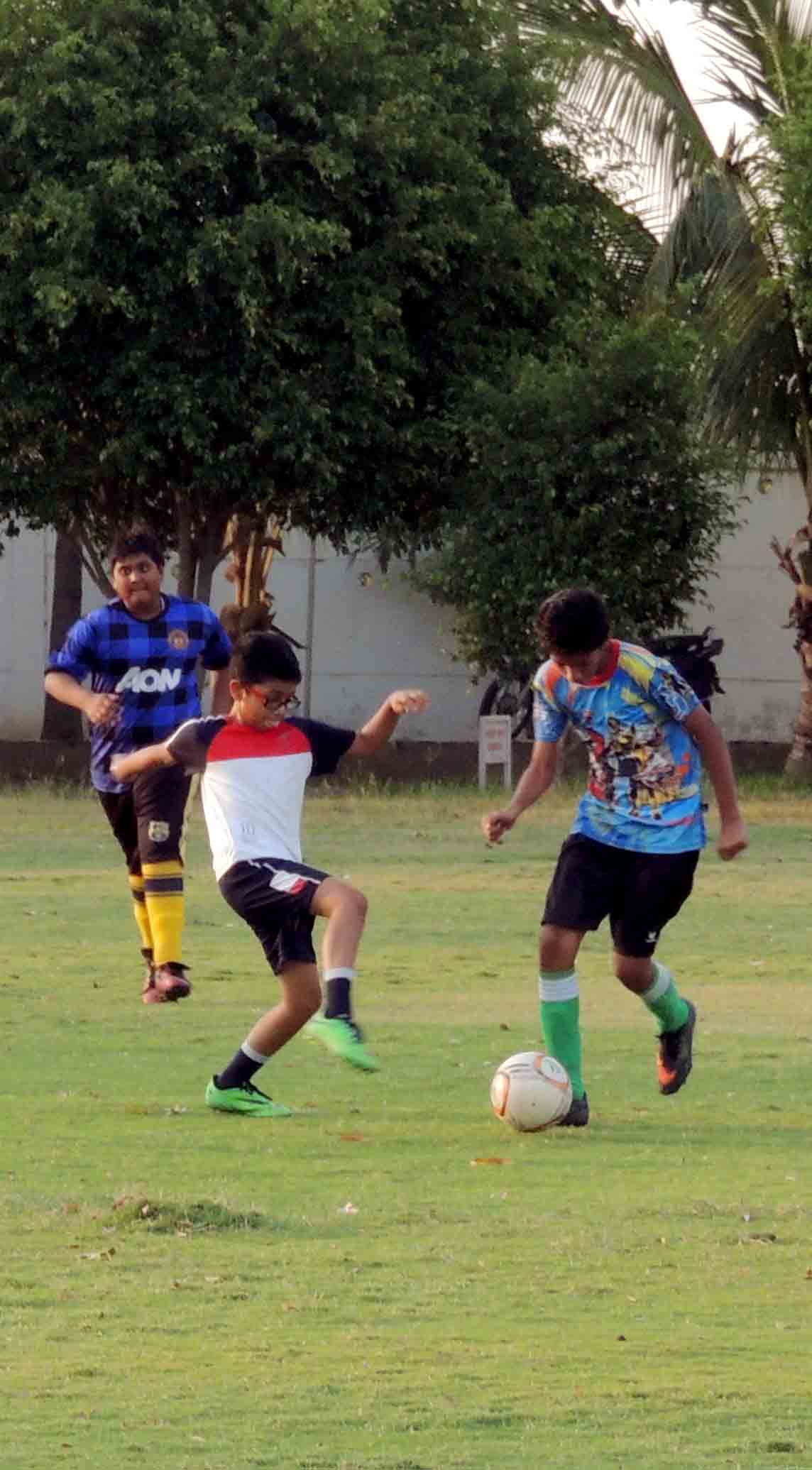 Bhopal , 24th May 2014:
Bhopal , 24th May 2014:The month long summer camp organized by Billabong High International School (BHIS) for school going children concluded recently. The kids learned the finer points of the game during the month-long camp.
Around 55 students from various schools of the city participated in it. The main aim of the camp was to enhance the mental and physical ability of the youth, honing their skills in different capacities.
Mrs Sujata Lakhani, Principal, Billabong High International School said “Summer camps not only help the child acquire new skills and polish existing ones, these also give the child an entirely new perspective of his ever-expanding environment”.
She also added that “It’s not just a camp pulled out from the dictionary. The idea is to give the kids a proper feeling of how a training process should be. A budding footballer needs to balance practice, diet and rest at the same time. But someone needs to tell them about it”.
Mr. Rahatullah Khan and Ms.Mona Shrivastava were the camp coordinators.
MM Team
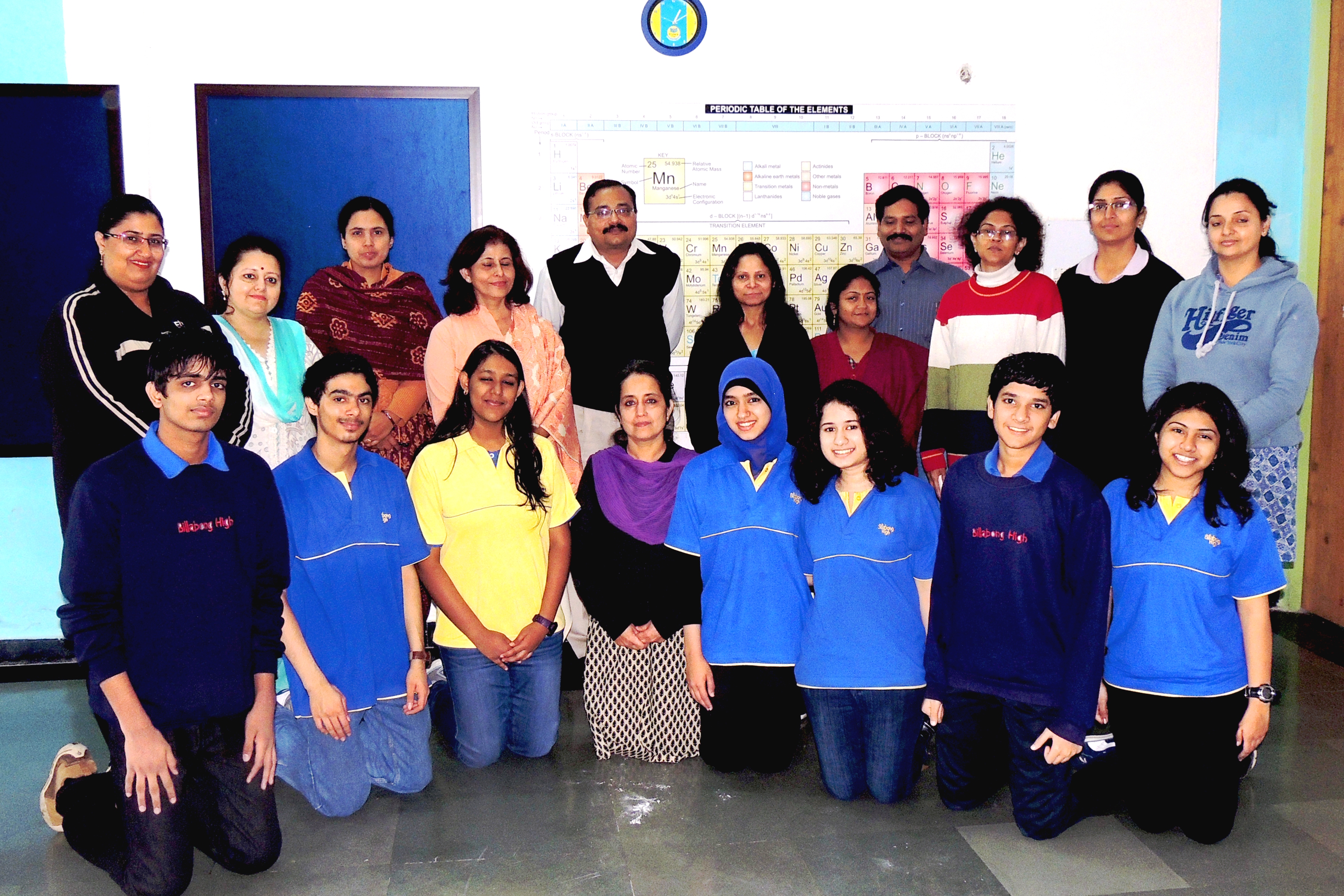 BHOPAL, 29th January 2014: Kurien Verghese, the man responsible for the phenomenal success of Amul was wont to say,
BHOPAL, 29th January 2014: Kurien Verghese, the man responsible for the phenomenal success of Amul was wont to say,“For those who believe no explanation is needed, for those who question the belief, no explanation is enough.”
This statement defines Billabong High Internationl School Bhopal philosophy. When a group of enterprising, resolute students registered with the CIE in January 2013, the air was thick with disbelief and scepticism, if not downright condemnation.
Now twelve months later, as Billabong celebrates riding wave of triumph of its students at the IGCSE exams, the detractors have been silenced and the taste of victory is sweet indeed. “Nothing succeeds like success,” although a trite saying, means much, no doubt.
Reposing faith in its existing set of teachers, Billabong High International School undertook the daunting task of preparing children in a record time period of ten months against the recommended duration of eighteen months. A* (above 90%) achieved by the children in Physics, Chemistry, Biology, Geography, Economics, English Language and Literature have brought smiles of euphoria on the faces of the staff, management, students and their parents.
IGCSE, which offers a plethora of seventy subjects, focuses on students applying subject knowledge to new and unfamiliar situations.” The two key aspects in Billabong’s successful introduction of IGCSE curriculum are implementation of Dr. Benjamin Bloom’s Hierarchy of Learning Objectives, and adaptation of teaching to suit the differing needs of learners.
MM Team
Resonance coaching institute will be conducting STaRT-2014 for the third time in all the 120 branches of Ryan International School. Around 2.40 lakh students – 122,706 from private schools and 118,333 students from government schools have enrolled themselves. The talent search exam STaRT-2014 is open for all the students starting from class five to XII, and will be conducted in two stages. The last date for registration is October 13.
Manoj Sharma, Vice-President (Business Development and Operations), said that in order to encourage and motivate the talented but under-privileged students, Resonance has made this exam free for all the students across India from Kendriya Vidyalaya (KV) and all the government school students.
Billabong has done it again!
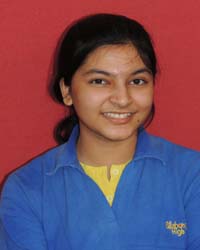 Bhopal, 17th May, 2013: Billabong International High School declares its ICSE result, where all the students fly with golden colors.
Bhopal, 17th May, 2013: Billabong International High School declares its ICSE result, where all the students fly with golden colors.Saumya Nair ( 97% ), Ipsa Agnani ( 93.8%) and Shrey Jain (91.2%) topped the list of successful candidates. 25% of the students secured over 90% aggregate marks and 62% secured over 80% aggregate. The remaining students secured above 77%
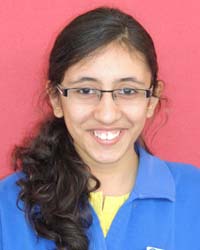 The second batch of students who appeared at the All India ICSE (after Grade X ) examination held in March 2013 passed out with flying colors and have done their school proud. All the students not only passed with distinction giving a pass percentage of 100%, but also shared among them nearly 100% distinctions per candidate.
The second batch of students who appeared at the All India ICSE (after Grade X ) examination held in March 2013 passed out with flying colors and have done their school proud. All the students not only passed with distinction giving a pass percentage of 100%, but also shared among them nearly 100% distinctions per candidate. 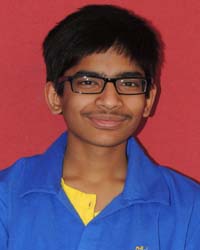 Mrs. Sujata Lakhani, Principal of Billabong High International School, says” Our students have again made us proud. They have passed with flying colors. We have done better from last year, we are very proud of our students. We congratulate the entire staff and students for their excellent hard work and result.”
Mrs. Sujata Lakhani, Principal of Billabong High International School, says” Our students have again made us proud. They have passed with flying colors. We have done better from last year, we are very proud of our students. We congratulate the entire staff and students for their excellent hard work and result.”The average aggregate of the school stood at a whopping 85.33%, which is 3% more than that of the year 2012. They bettered last year’s result both individually and collectively.
On the qualitative scale this year’s results are certainly an academician’s delight.
MM Team
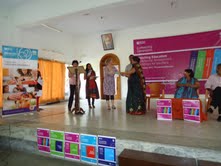 PANINI JNANPEETH English Medium Higher Secondary School of Hoshangabad has registered itself among the most elite society of schools all over the world by developing International Links with schools from different countries on Online Connecting Classrooms.Panini Jnanpeeth, in this venture, has opened a new window on the world for the students where these future kids brush up their talents with the most fertile minds and give themselves a chance to explore and widen their horizons.Panini students are going to connect them with their Pakistan based Partner school named Dominican Convent from Bahawalpur where there is a online discussion is scheduled on the topic - History of Sub-Continent : Shared features. Later the students shall accompany their teachers to Delhi where they will get a first hand information about the Indian Monuments . Panini in this entire venture has created a wonderful change among the students who by no means feel themselves a bit low or inferior to any of their foreign counterparts. The whole school family deserves a loud round of applause.
PANINI JNANPEETH English Medium Higher Secondary School of Hoshangabad has registered itself among the most elite society of schools all over the world by developing International Links with schools from different countries on Online Connecting Classrooms.Panini Jnanpeeth, in this venture, has opened a new window on the world for the students where these future kids brush up their talents with the most fertile minds and give themselves a chance to explore and widen their horizons.Panini students are going to connect them with their Pakistan based Partner school named Dominican Convent from Bahawalpur where there is a online discussion is scheduled on the topic - History of Sub-Continent : Shared features. Later the students shall accompany their teachers to Delhi where they will get a first hand information about the Indian Monuments . Panini in this entire venture has created a wonderful change among the students who by no means feel themselves a bit low or inferior to any of their foreign counterparts. The whole school family deserves a loud round of applause.